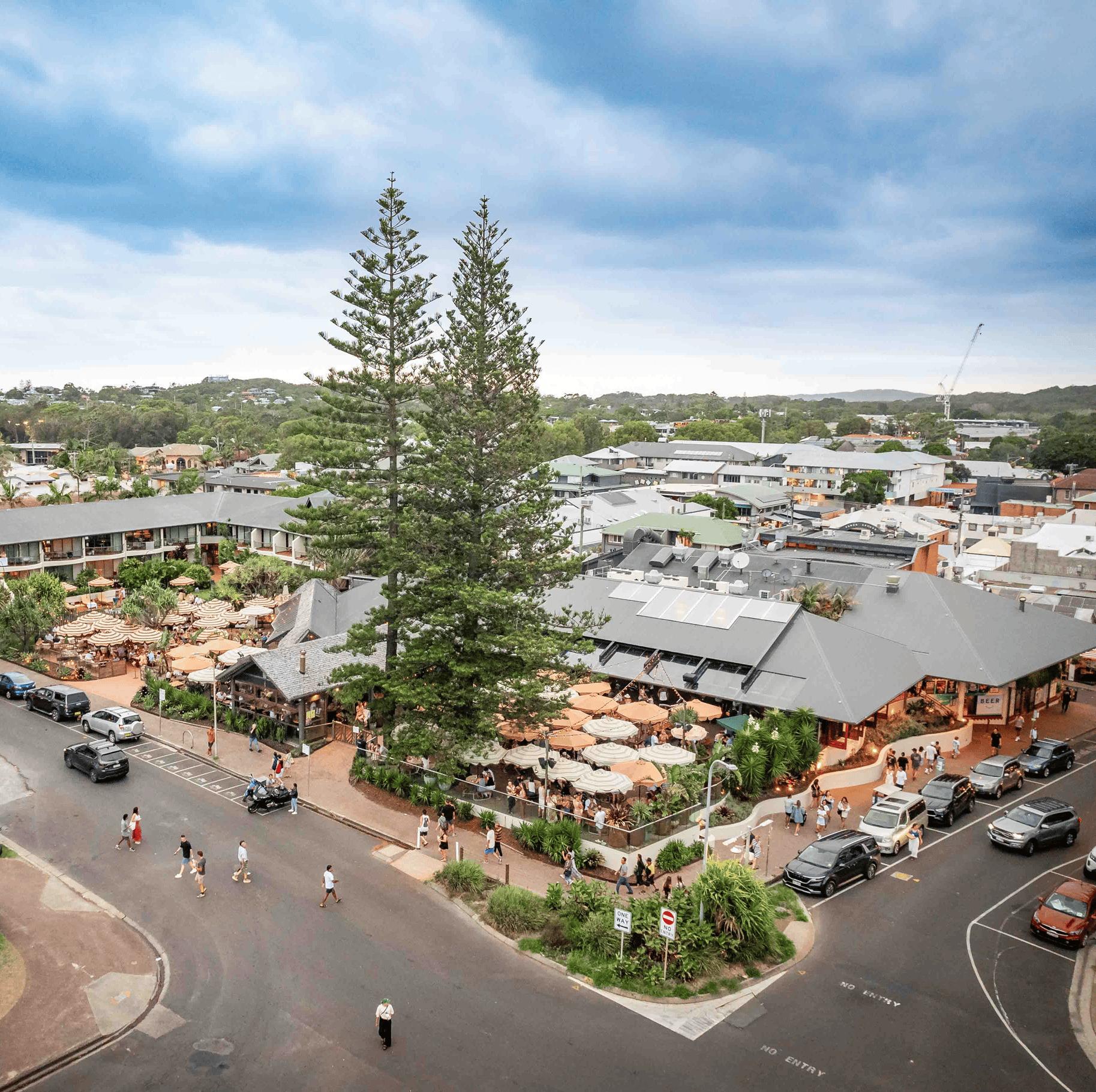

Embracing Change Exceeding Expectations
LOW ADMIN FEE




12 Cover story: There’s an increased investment appetite for pubs this year, as evidenced by the deals JLL has brokered so far this year.
Ed’s Pick
14 Pub Leaders Summit Review: Publicans shared plenty of knowledge and created new connections at the 2025 Summit at Eatons Hill Hotel.
20 Sports Bars: Investing in sports bars now goes beyond showing big games on the big screen.
Property and Investment: Pub investment is shifting to fast-growing residential pockets – but it requires a medium- to long-term commitment.
REGULARS
8 News: What’s happening in pubs across Australia.
30 Design & Build: The Pub Leaders Summit Study Tour gave attendees plenty of food for thought when it comes to modern pub design.
34 Tales from the Top: The new owners of the Yackandandah Hotel take on a hospo tree-change.
Editor’s Note

ON 21 July, Australian Hotelier was very proud to host the Pub Leaders Summit in Brisbane at Eatons Hill Hotel, with our co-hosts CocaCola. I think it was our best one yet, as a group of 290 publicans and industry stakeholders came together to share ideas and connect.
We covered some pertinent topics throughout the program, but the throughline for all the sessions seemed to be the importance of your teams. From a keynote on team culture to a panel on leadership wellbeing and everything in between, it was increasingly clear that in a well-oiled industry, it’s the performance and mindset of your team that can give you the advantage over your competitors.
We share some of the insights from the Pub Leaders Summit in this issue of Australian
Hotelier – there’s some great food for thought from page 14. We also celebrate the winner of the Future Leaders Scholarship, first announced at the Summit. Find out who this bright industry star is on page 10. And in a special Design & Build feature, we provide an inside look at the Pub Leaders Summit Study Tour, which visited three fantastic new and transformed (or transforming) pubs in Brisbane. Keep an eye out for news of the 2026 Pub Leaders Summit – we hope to see anyone working in pub operations there!
Cheers!
Vanessa Cavasinni, Editor E: vcavasinni@intermedia.com.au
PUBLISHED BY: Food and Beverage Media Pty Ltd 41 Bridge Road GLEBE NSW Australia 2037 Tel: 02 9660 2113 Fax: 02 9660 4419
PUBLISHER: Paul Wootton
EDITOR: Vanessa Cavasinni vcavasinni@intermedia.com.au
NATIONAL SALES
MANAGER: Jason Wild Tel: 02 8586 6213 jwild@intermedia.com.au
GENERAL MANAGER SALES –LIQUOR & HOSPITALITY GROUP: Shane T. Williams
GROUP ART DIRECTOR –LIQUOR AND HOSPITALITY: Kea Webb-Smith kea@intermedia.com.au
PRODUCTION MANAGER: Jacqui Cooper jacqui@intermedia.com.au
SUBSCRIPTION
(Mon

ZERO CARB *
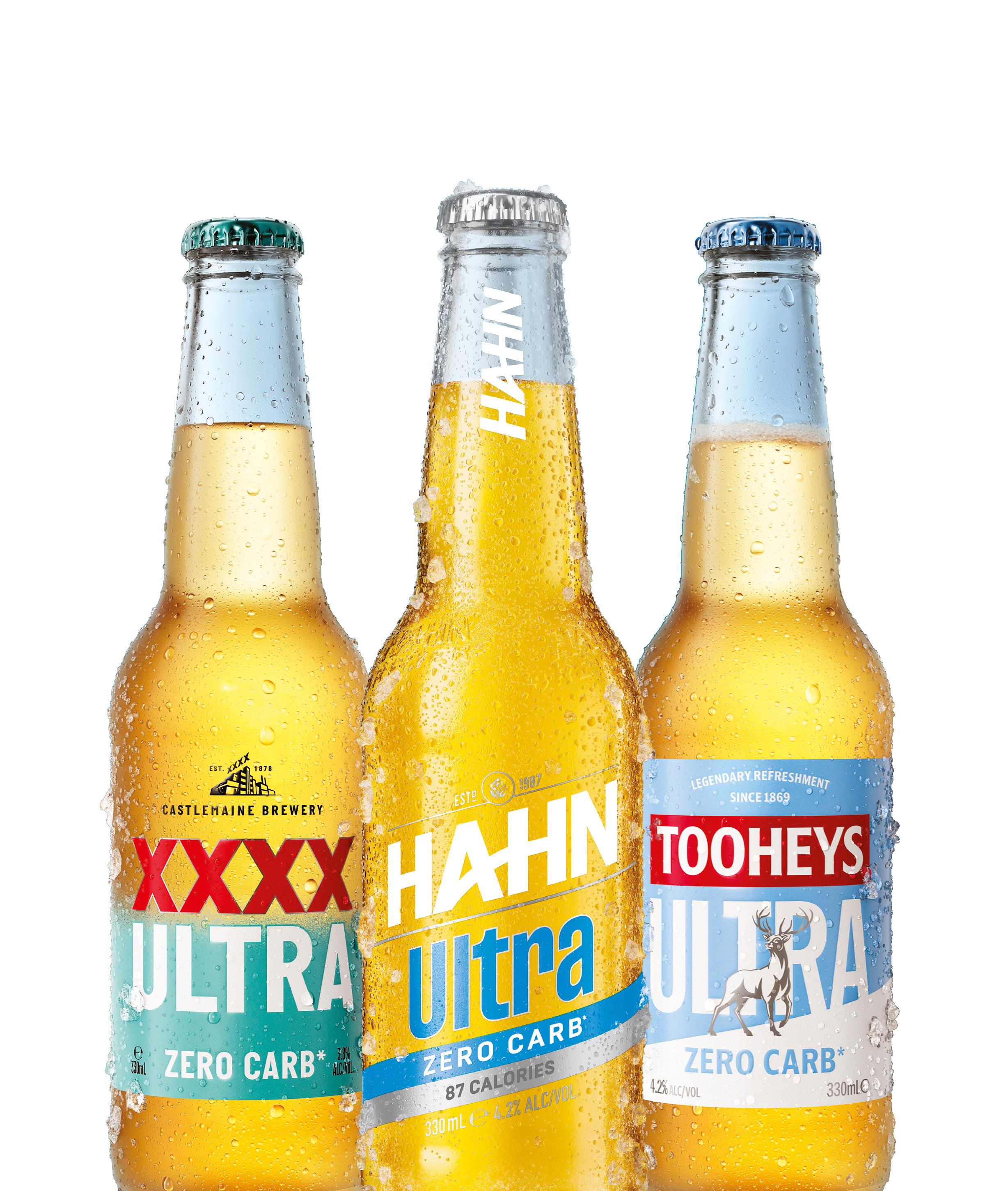
In the news
WHAT’S HAPPENING IN PUBS ACROSS AUSTRALIA
Vale Margaret Hargreaves
Margaret Hargreaves, the former owner of the Shakespeare Hotel in Sydney’s Surry Hills, has died.
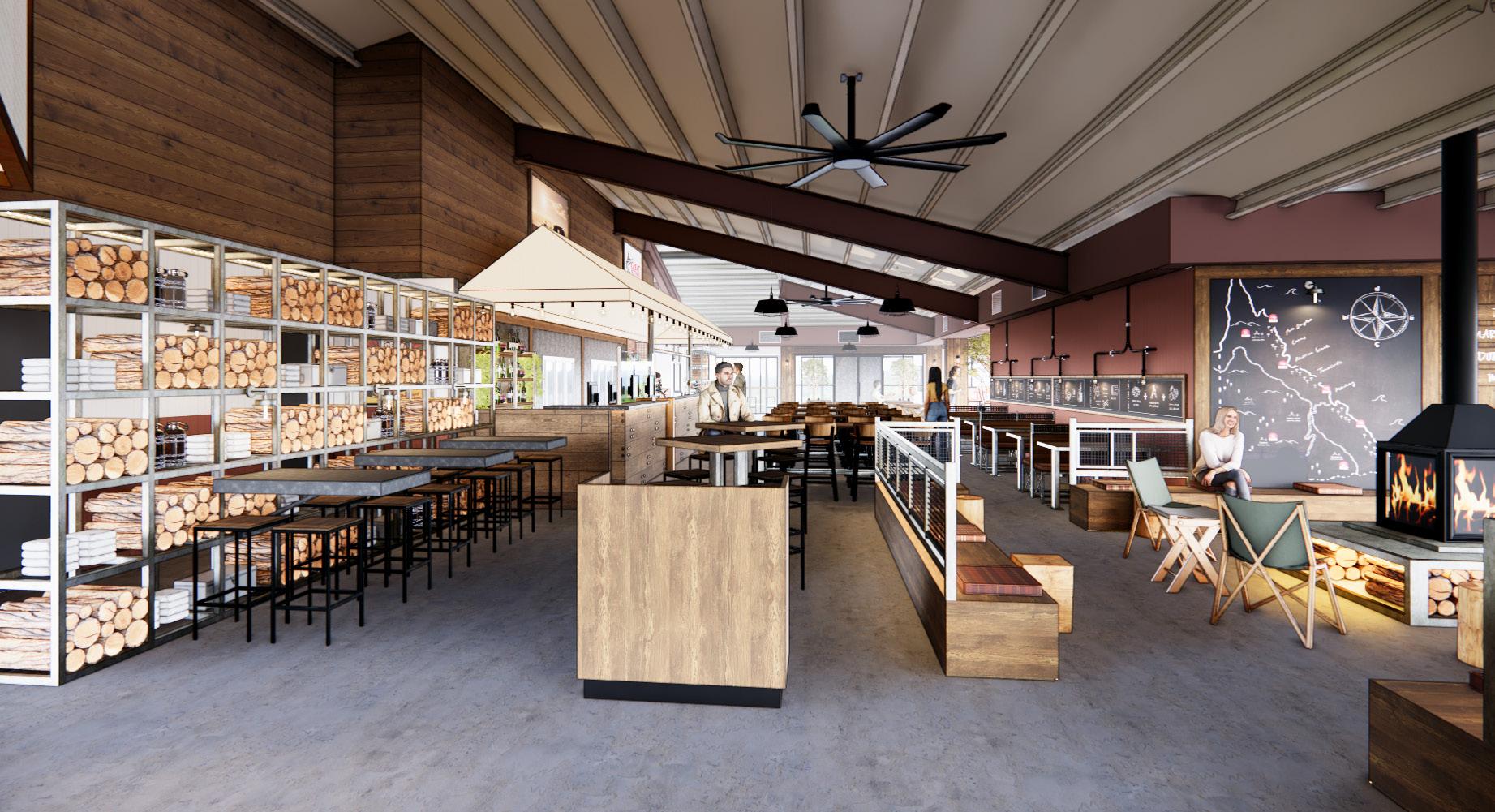
John Green, the Director of Liquor and Policing at the Australian Hotels Association NSW described Margaret as an example of a generation of strong women, who not only broke down barriers in the 70s but led the way by becoming one of the inner city’s top pub owners.
“She was a trailblazer with her own unique style and her passing is a loss for the industry,” Green said.
“Operating two pubs in Surry Hills, the Shakespeare Hotel from 1975 until recently, as well as the Strawberry Hills Hotel, Margaret and her family – including daughter Kelly – led the way with their resilience and determination during challenging times including COVID and the light rail construction, which caused massive disruption to the business.”
Margaret ran the Shakespeare Hotel for almost 50 years, after acquiring the leasehold in 1975 and then freehold in 1978.
She sold the pub last year to Laurence Collins and his family, and said at the time: “There is nothing quite like the Shakey. The pub has been very good to us, but the time is right for a fresh perspective.”
The team at Australian Hotelier extends our sincerest condolences to Margaret’s family and friends.

ALH, ASAHI BEVERAGES PARTNER ON FLAGSHIP GREAT NORTHERN VENUE
ALH, Endeavour Group and Asahi Beverages have partnered on Northern Grounds, a flagship Great Northern venue opening on Queensland’s Sunshine Coast. Built on the site of the former Waterfront Hotel in Diddillibah, Northern Grounds has been reimagined as a world-class venue inspired by the spirit of a Queensland camping trip. The concept blends the beloved features of a local pub, reimagined for the outdoors, with coal-cooked meals and flowing beers, located just metres away from the surf.
The venue, a joint venture by Asahi Beverages, ALH Hotels, and Endeavour Group, has been transformed following a $5.1m investment.
ALH Hotels managing director Paul Carew says Northern Grounds is a significant investment in the Southeast Queensland region, reflecting Great Northern’s popularity among Queenslanders.
“We’re extremely excited to be opening the doors to Northern Grounds, the latest ALH venue in Queensland and a unique new offering for the region,” stated Carew.
“We’re not just opening a pub; we’re creating a destination that truly embodies the spirit of Queensland – mateship, simplicity and that deep connection to our incredible outdoors. Northern Grounds is our commitment to giving locals, day trippers, and holidaymakers a unique place to connect, relax, and enjoy the best of Queensland hospitality.”
Asahi Beverages’ Chief Commercial Officer, Nigel Parsons, says the venue has been designed to capture the spirit of the laid-back, communal, and natureinspired elements of the Australian camping experience.
“Great Northern is Australia’s most popular beer brand, and what better place for us to launch this concept than in its home state, Queensland. We wanted to create a space where people can connect with the brand in a more tangible way. The pub will embody the spirit of Great Northern – no fuss, warm and welcoming, and the perfect place to catch up with mates or take the family,” Parsons said.
Following 15 years without renovation, the space has been completely reinvigorated by Cayas + Ward Architects and builders Herron Coorey. Northern Grounds features firepits surrounded by communal seating, and classic Queensland iconography including a map marked with punters’ favourite camping, fishing, and hiking destinations.
On tap at Northern Grounds, patrons can enjoy the full range of Great Northern brews, alongside a selection of classic, contemporary and craft beers including fellow Queensland brews Balter and Green Beacon, and the popular Hard Rated. Doors will open to the public on Friday 15 August.
A render of the Northern Grounds design

Momento Hospitality launches entertainment and event space, Bella LIVE
Momento Hospitality has opened Bella LIVE, a warehouse-style entertainment space at Bella Vista Hotel.
Following a multi-million-dollar transformation of its expansive 1029m2 warehouse-style space, Bella LIVE at Bella Vista Hotel is expected to emerge as a vibrant cultural hub for Sydney’s northwest – a region long overlooked by touring acts.
Engineered for scale and flexibility, Bella LIVE is equipped to meet the technical demands of major national and international tours, while also creating space for emerging and local talent to thrive. The space has been designed to be flexible enough to host a headline DJ set, stand-up comedy night, major sporting event, or major corporate experience.
“Bella LIVE is redefining entertainment in the Hills,” stated David Clifton, Momento Hospitality’s CEO.
“We’re bringing the soul of Sydney’s nightlife to Bella Vista –no commute required. It’s a space that’s premium but inclusive, future-facing and grounded in community. As the region evolves, so does the appetite for diverse, high-quality experiences. Bella LIVE is built to deliver on that.”
A flexible space
Designed by Archebiosis Architects, Bella LIVE combines sleek, modern aesthetics with an edgy industrial warehouse feel. The space is anchored by a 17.5-metre bar and a commanding 10x8m stage, flanked by VIP booths for an exclusive viewing experience. It has a capacity of 1500 people.
Design details include concrete-rendered finishes, glossy red accents, marble terrazzo benchtops and glowing linear pendants.
The atmosphere is elevated further with immersive visual projections, a custom audio system, dynamic LED stage lighting, and moody, cinematic interiors that amplify every moment. Bella LIVE features three main spaces:
Raising the bar for suburban venues, Bella LIVE is also outfitted with two green rooms, complete with luxe finishes, private ensuites, and full backstage amenities. These premium spaces meet rider expectations for A-list performers, positioning Bella LIVE as a serious player on the national touring circuit.
For businesses and event organisers, Bella LIVE is positioned as a space where tech meets taste. It is capable of delivering strategy days, TED-style talks, gala dinners and private events with flair, flexibility and high-end production. With modular event spaces, full AV integration, and in-house event producers, it’s expected to be a new option within Sydney for corporate launches and networking nights.
Bella LIVE’s line-up of live acts and international DJs intends to bring serious energy to Sydney’s northwest, ranging from boiler room techno nights to soulful Sunday sessions. Sports fans can catch UFC, F1 and Premier League action on giant screens in an electric atmosphere, while celebrity lunches, athlete meet-and-greets, and brand activations will add a new dimension to game day.
Comedy and cultural programming will also be hosted in the space, including open mic nights, improv shows, roast battles, and author talks. Family-friendly events will including weekend markets, silent discos, and school holiday activities.

Future Leaders Scholarship 2025 winner revealed
FOR THE second year in a row, Australian Hotelier ran its Future Leaders Scholarship program, in partnership with Allara Learning, Allara Global and Asahi Beverages. The scholarship’s aim is to help foster the careers of people working in pubs at the AVM level, in specialised roles or in junior group roles.
The finalists were invited to attend the Pub Leaders Summit conference, where they were celebrated throughout the day, before a ceremony at the end of the conference brought all the finalists on stage where they were acknowledged by the 290 publicans and industry stakeholders in the room.
The finalists came from all over Australia – from Adelaide to Queensland’s Lockyer Valley.
“We’re so pleased to do our part in putting a spotlight on new talent in the industry, and helping them develop new leadership skills that will progress their careers within pubs,” stated Australian Hotelier managing editor Vanessa Cavasinni.
The winner
Suzie Quinsey, assistant venue manager of the Morphett Arms Hotel in Adelaide, was chosen by a select group of judges as the 2025 winner of the Future Leaders Scholarship.
Quinsey has worked her way up in the Palmer Hospitality Group venue over the last 11 years, starting out as a F&B attendant, before becoming the pub’s functions manager, and now AVM.
In a field of ten worthy finalists, Quinsey was chosen for a combination of her array of experience across pub operations, her clear ties to the local community and a succinct understanding of the upskilling required to progress her career in pub leadership.
“Being named the Future Leaders Scholarship winner is an incredible honour. I feel grateful of the recognition for the hard work and dedication I’ve put into my work, it also motivates me to continue striving for excellence and making a positive impact in my workplace,” stated Quinsey. “I’m excited for what lies ahead and thankful for the
opportunity to grow as a future leader.”
Abby McDonough, manager of the Morphett Arms Hotel showered praise on Quinsey’s abilities.
“I’m incredibly proud to see Suzie recognized as the recipient of the Australian Hotelier Future Leaders Scholarship, a truly well-deserved acknowledgement of her dedication and capability. Suzie’s leadership, her commitment to continuous learning, and her genuine respect and passion for the hospitality industry make her an outstanding representation of the next generation of hotel leaders.
“I have every confidence she will make the most of this opportunity, generously supported by Australian Hotelier, Allara Learning and CUB. The entire team at the Morphett Arms Hotel, along with our patrons and wider community, are so proud of Suzie’s achievement and look forward to watching her continue to grow and contribute meaningfully to the future of our industry.”
As the winner, Quinsey will receive year-long access to Allara Learning and
The Future Leaders Scholarship winner Suzie Quinsey (second from left), with Ian Giles, Asahi Beverages; Vanessa Cavasinni, Australian Hotelier; and James Richards, Allara Learning
Allara Global leadership courses, as well as personalised mentorship with an Allara facilitator, valued at $4000. She has also won a bespoke leadership masterclass series for herself and up to 15 emerging leaders in her venue or group delivered by Allara Learning, valued at $12,000.
“Having won access to all the Allara resources listed in the prize is incredible. It will be extremely valuable for my journey in hospitality management,” stated Quinsey.
Allara Learning’s national general manager James Richards stated: “Allara Learning was delighted to renew our partnership with Australian Hotelier for the Future Leaders Scholarship. We understand the vital importance of quality training and mentoring in developing the pub sector’s next-generation leaders.
“This year’s applicants truly impressed us, and the winner had demonstrated that by investing in her own skills to better serve her team, she can directly impact how the team deliver an exceptional guest experience and set a new standard for service excellence.”
Peter Yeomans of Asahi Beverages concurred.
“Asahi Beverages/Carlton & United Breweries was proud to support the Future Leaders Scholarship program once again this year. Pubs are a vital part of our industry, and helping to nurture the next generation of publicans is key to ensuring its ongoing success.
“The calibre of applicants was truly impressive, showcasing the passion, dedication, and potential that exists within the next generation of industry pub leaders. We were also pleased to work alongside Allara Learning, who have been instrumental in equipping participants with the skills and confidence to thrive. It was a privilege to host this year’s finalists and winners at Green Beacon Brewery for a one-of-a-kind experience, and we’re confident this outstanding group of emerging publicans will go on to build successful, long-lasting careers in the pub sector.”
Quinsey was appreciative of the prizes, which will help her grow as a leader within hospitality.
“The resources will provide me with, insightful mentorship, and industry knowledge that will help me develop as a confident leader. This support is going to help me to better manage teams and operations.”
She said that she hopes that the Future Leaders Scholarship win will be of benefit not only to herself, but to those around her.
“I want to use this opportunity to further develop my leadership skills, while also supporting and connecting with others in my team as they work on developing theirs. Ultimately, I hope the scholarship helps me grow both personally and professionally so I can become a stronger leader in the workplace.”
Quinsey also had some advice for anyone considering applying for the Scholarship next year.
“To anyone thinking of applying for the Scholarship next year, I’d say go for it! This opportunity can open doors you didn’t even know were there. The resources, mentorship, and support you receive can make a real difference in your personal and professional growth.”
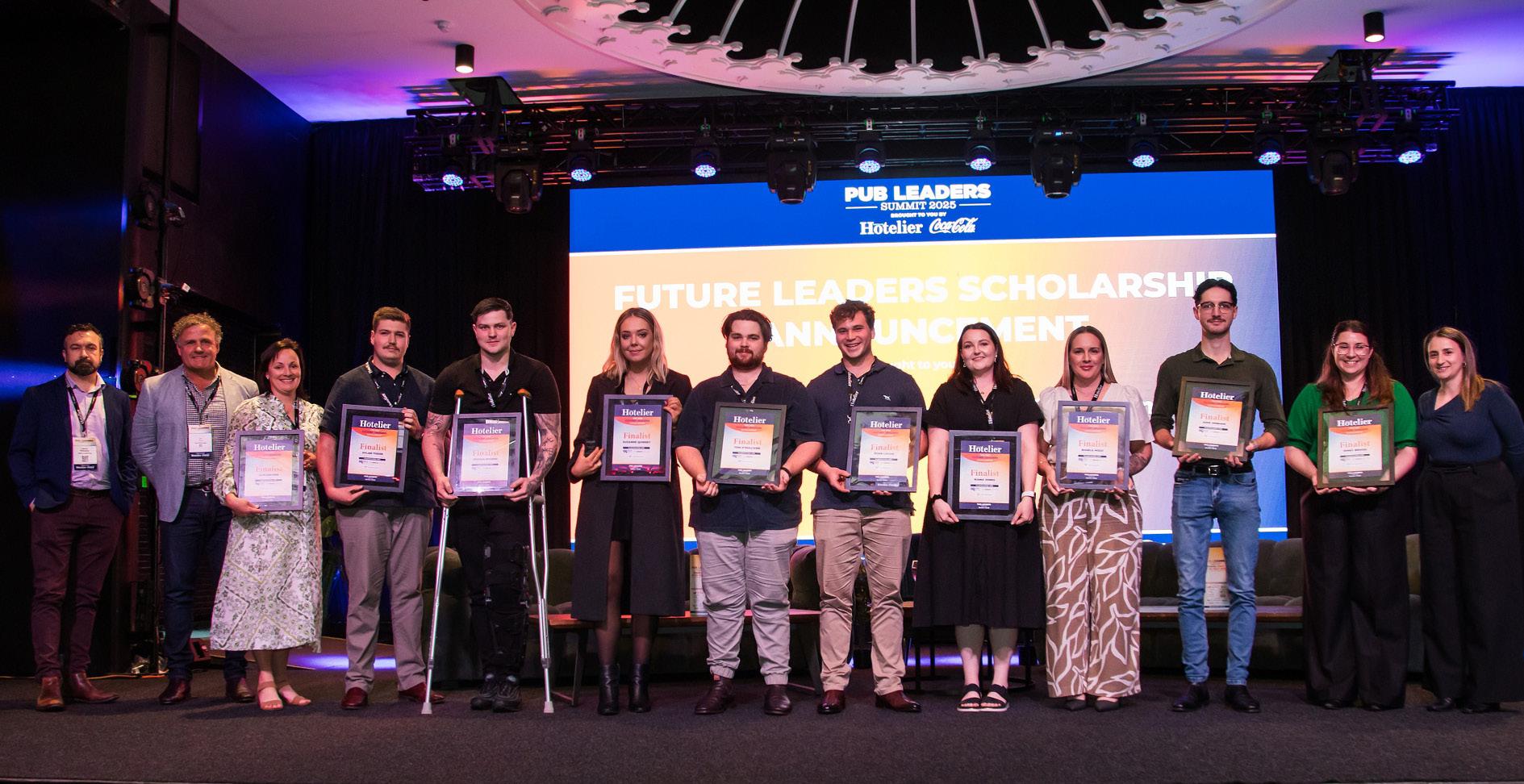
The finalists were all celebrated at the Pub Leaders Summit at Eatons Hill Hotel
Pub assets in high demand amid market momentum
Renewed confidence and the resilience of pub assets are driving increased investment appetite – a trend reflected in the standout venues brokered by JLL this year.

DESPITE ONGOING economic and legislative pressures, the demand for quality pub assets has surged and the investment market is showing renewed momentum. Backed by strong trading and the sector’s ability to adapt to shifting consumer behaviours, investors are showing confidence in pubs as resilient, community-driven assets.
Ben McDonald, head of pubs, investment sales at JLL Hotels & Hospitality Group, describes the recent uptick in demand and heightened engagement in the sector as a critical opportunity for owners considering divestment options.
“Renewed confidence, robust trading fundamentals and the fact that we are seeing growing demand from a diverse investor base is really encouraging and is ultimately what’s fuelling transaction activity,” he told Australian Hotelier.
National pub market strengthens
In a state-by-state breakdown, New South Wales remains a key market for pub investment. Despite concerns around proposed gaming reforms, the investment market is experiencing increased activity, and in particular, strong demand for largeformat opportunities.
Representing a significant milestone for the industry and one of the largest pub sales in Australian history, the Beach Hotel in Byron Bay is one of many large-format coastal pub sales brokered by JLL this year.
Meanwhile, the $25m Duke of Dural transaction, renowned for its high-quality food and beverage along with 2am trading approval and 30 gaming machines, signals growing interest in diverse revenue streams, particularly in Sydney’s outer suburbs.
“In New South Wales, key metropolitan growth corridors where there has been significant government infrastructure spending are heavily sought after, along with large-format coastal pubs in tourism hotspots.
“Pubs offering clear revenue diversification and those with tangible value-add potential remain highly sought after as hoteliers seek to balance portfolio earnings and/or move away from an over reliance on any one revenue stream,” McDonald explains.
In Queensland and South Australia, the market is also going from strength to strength. Stability in legislation and investment in infrastructure ahead of the Olympics is driving demand in southeast Queensland in particular.
“Moving forward into the second half of 2025, there are no signs of demand slowing with significant buyer mandates across a mix of asset profiles. Due to asset supply constraints and heightened competition for premium assets, we envisage these mandates to expand in terms of asset profile, geography and business mix,” says McDonald.
After a year of consolidation, the South Australian market is attracting both local and interstate operators, highlighted by New South Wales-based operators Oscars Hotels acquiring their first South Australian pubs – the Lakes Hotel, Maid & Magpie and Bridgeway Hotel – from long-time local publicans, the Fahey family.
Although Victoria’s pub market experienced a dip in transactional activity in 2024, the state has also shown its resilience with a sense of renewed appetite finally emerging. A resurgence in activity means sales are attracting competitive yields, and JLL’s transaction highlights include Melbourne institution the Bells Hotel and the Queenscliff Brewhouse.
Looking ahead, McDonald is optimistic that those strategically evolving with the investment landscape are positioned for longterm growth and sustained profitability.
“Our industry continues to adapt brilliantly, showcasing the entrepreneurial spirit that defines Australian hospitality. The evolving consumer behaviours we’re witnessing present exciting new opportunities for those ready to embrace change,” he concluded.
The sale of Beach Hotel Byron Bay was one of the largest pub sales in Australian history.
Join the thousands of industry professionals who read the Australian Hotelier newsletter. Scan here and subscribe for free.

Subscribe now for the latest pub news, sales, compliance changes, and innovations. Delivered to your inbox fortnightly!
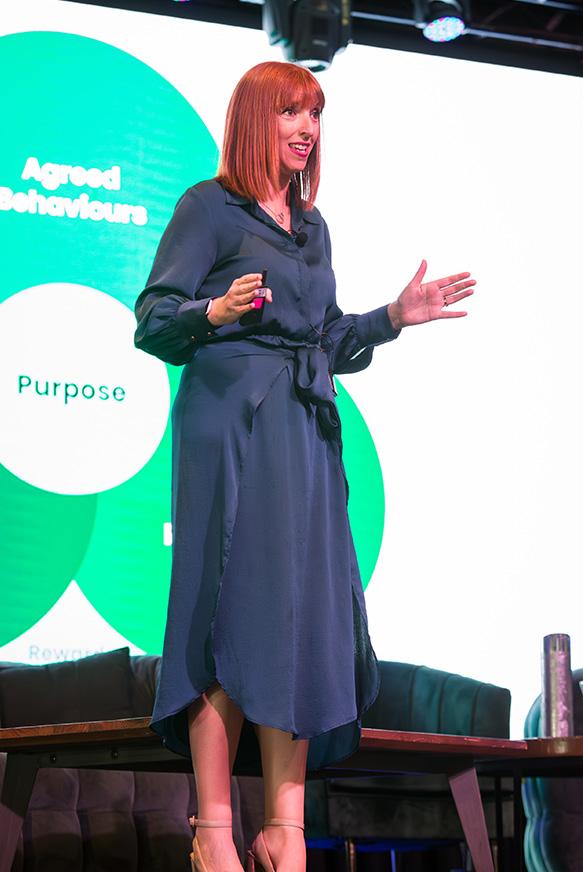

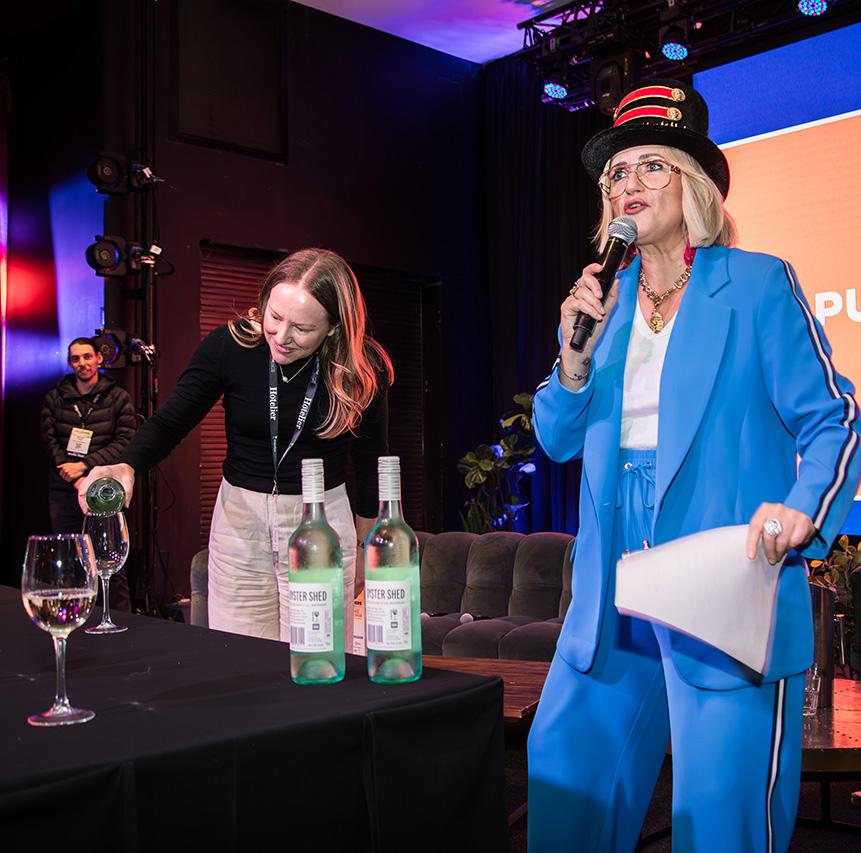

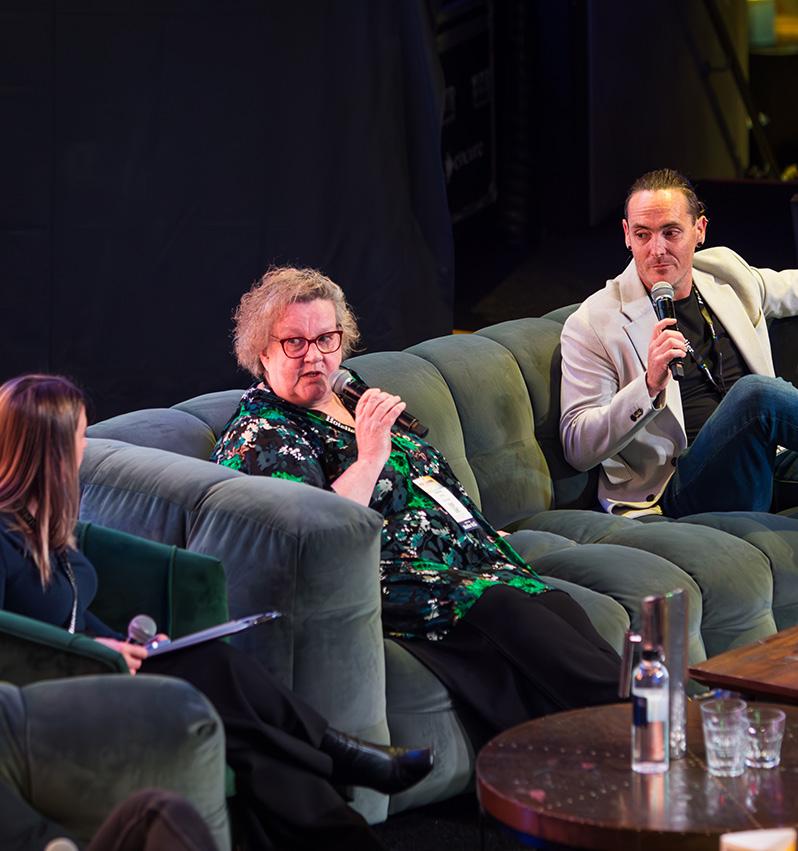


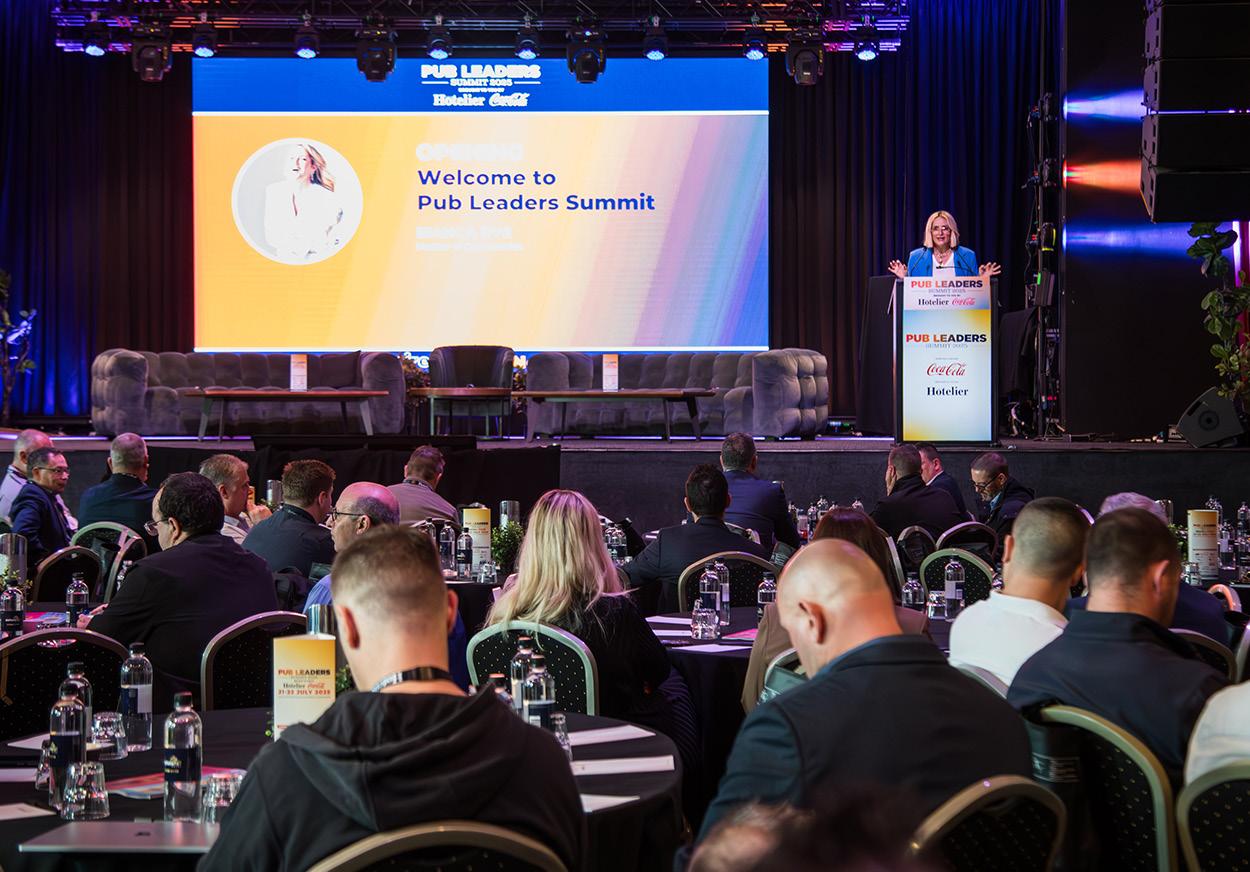


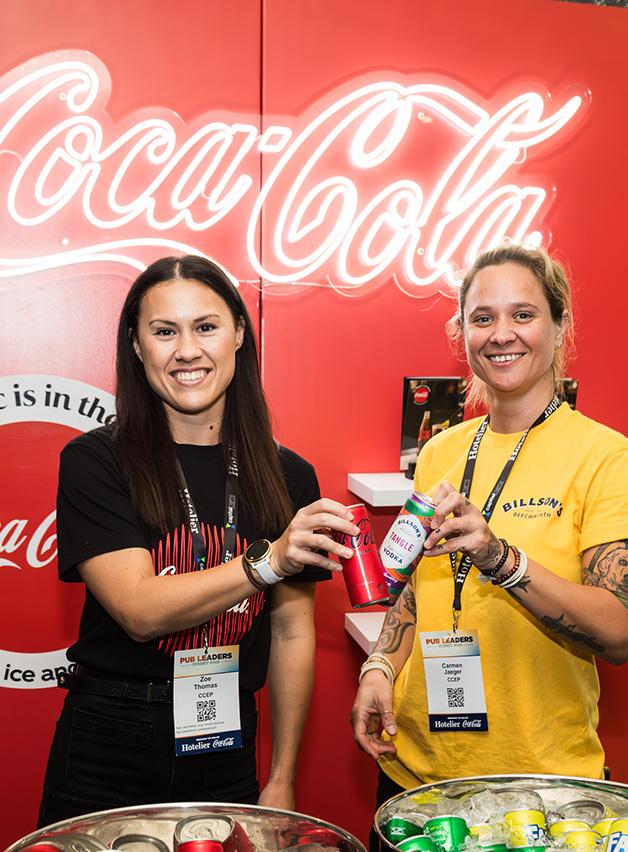
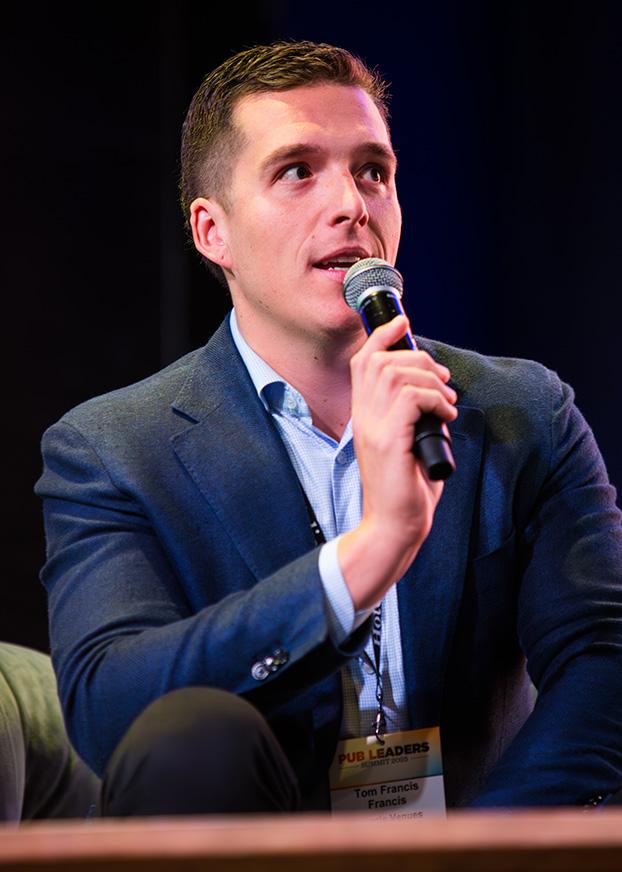

Teams, patrons and tech: Insights from the Pub Leaders Summit
The Pub Leaders Summit, brought to you by Australian Hotelier and Coca-Cola, returned to Eatons Hill Hotel on 21-22 July, drawing a crowd of more than 290 publicans, operators and industry stakeholders from across Australia. These are some of the insights shared during the conference.
THE FULL-DAY program tackled some of the industry’s most pressing opportunities and challenges. Featuring a strong lineup of leading pub operators and hospitality experts, the sessions explored everything from workplace culture and leadership wellbeing, to the evolving role of technology in the pub landscape.
Stephen Wools, cofounder and CCO of Ballers Clubhouse Australia, saw the benefit of the Summit for anyone working in hospitality, as a place to share ideas, learn and network.
“I think anyone who’s in hospitality, whether it be operational management or you own a venue, get to a Pub Leaders Summit to learn and talk and network with other people who face similar challenges.
“Whilst there’s people here who are competitors, it’s also good to share ideas and talk about similar pain points, and understand the evolution of technology and the industry. It’s a really good way to network, create good connections, and also there’s a lot of different suppliers here too.”
There were three prevalent themes throughout the day: the importance of venue teams to any component of operations; the behaviours of a considered and mindful patronage; and the rapidly evolving role technology plays in hospitality.
Here are some of the key insights along those themes that emerged at the Pub Leaders Summit.
The importance of your team
The Pub Leaders Summit kicked off with a keynote entitled ‘Creating a Culture of Innovation for Pubs
to Thrive’ by Dream Culture CEO Shelly McElroy, emphasising how creating a culture by design within your venue can help improve your business. Among other insights, McElroy shared these key strategies to get your team culture where it needs to be for everyone to perform at their best:
• Shared vulnerability: Being able to make mistakes, ask questions and be honest, and be transparent.
• Creating psychological safety: This comes from focusing on relationships, owning mistakes and empowering staff.
• Clear sense of purpose: Make sure your purpose is clear, your staff are aligned with it, and you have crucial conversations to communicate that. Set your expectations and purpose from day one.
• The 51%er hiring philosophy: When you bring people into your business, are you clear about how you want them to behave? Hire for cultural fit, not just skills.
In his one-on-one interview, Paul Carew, new managing director of ALH Hotels talked about a big change the group just enacted last week to get the cultural fit right within the organisation. Australia’s largest pub group has done away with the term of venue managers, with staff at this level now known as publicans, so they can take on that role as a local identity within their communities.
“We can’t just say it, we have to live it and breathe it,” stated Carew.
“We’ve had staff say they feel proud to have that title. It’s been received really well.”
Mentions of the importance of staff engagement

There were so many great takeaways… I think one of the biggest things for me was the conversation about AI, it was so important –completely new information to me.
Anna Hurley, Hurley Hotel Group
and training were mad throughout the day, which was also bookended by a short session on leadership wellbeing and tackling burnout.
Lucinda Dowling-Black, director of the Full Moon Hotel, noted that burnout in management can look like cynicism, decision-fatigue, lack of joy, but that there is also an overfunctioning element and reactivity.
Both Dowling-Black and panellist Julie-Anne Whitfield, workplace program manager for R U OK? suggested that for hospitality leadership, it was important to create a network of people who understand your challenges, your commitments and your passion, who you can be honest and vulnerable with.
The consumer outlook
Another highlight of the day was the keynote presentation by Craig Woolford, senior analyst at MST Marquee, on ‘Achieving the Most from a Better Consumer’ – brought to the Summit by Coca-Cola.
Woolford set out a picture of the current Australian consumer, and how they are expected to behave in FY26.
He argued that while cost-of-living pressures are easing, consumers are still budget conscious given low levels of savings. Consumers are beginning to spend again but they’re deliberate in where they spend.
While overall liquor consumption (both on- and off-premise) has been in long-term decline, he posited that on-premise spending growth should remain steady in the next 12 months. Meanwhile, dining out is showing positive growth, particularly in the casual dining sector, and gaming in pubs and clubs is in growth, outperforming liquor growth.
Woolford made the point that consumers were still quote deliberate in their spending but going out, and
that retailers and publicans can no longer attribute declining sales to weaker household income, cost-ofliving or lack of consumer spending.
“If pubs are doing well, it’s because they’re executing well.”
Woolford’s findings were backed later in the day by those of Tom Graham at NIQ, whose global and domestic drinks data created a portrait of an Australian consumer who were moderating their spending, but looking for best value-for-money and good quality when it came to their drink choices.
Consumers are also moderating their drinking by alternating rounds between alcoholic and non-alcoholic beverages (known as ‘zebrastriping’), or simpler drinking fewer rounds. Where there has been more growth in visitation and drinks spend has been in experience- or eventbased occasions (eg. themed event, ticketed event, live music), at the expense of casual visits and lowertempo occasions like a date night or anniversary.
These points by Woolford and Graham were echoed by the operators on the F&B Outlook panel, with Ben Turner, GM of Food at Redcape, emphasising that ‘value’ components of the groups menus and drinks lists were performing the best; and Mark Condi, CEO of Duxton Pubs, stating that consumers were happy to still spend if they felt they were paying for an entire experience, created through lighting, music and other entertainment.
The role of AI and tech in hospitality
The other big topic at the Pub Leaders Summit was the role of tech – particularly AI – in evolving hospitality operations.
One of the most talked about sessions of the day was the

I think anyone who’s in hospitality, whether it be operational management or you own a venue, get to a Pub Leaders Summit to learn and talk and network with other people who face similar challenges.
Stephen Wools, Co-founder and CCO, Ballers Clubhouse Australia







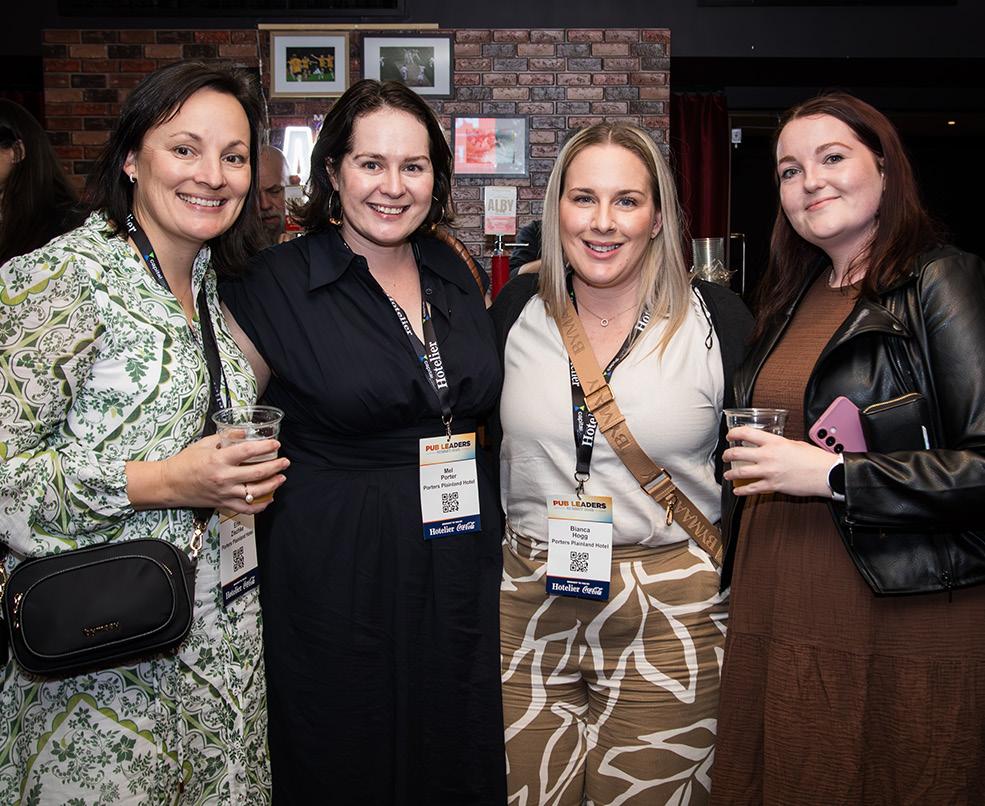



presentation ‘How to Get Your Venue Found in an AI World’ by Celia Harding, founder of LEOPRD.
As people shift their online searches away from traditional search engines like Google and ask more questions of LLMs like ChatGPT (ChatGPT added one million users around the world in one hour in April this year), venue operators need to focus on how people can find their venue through the likes of ChatGPT.
Harding explained that these LLMs all have different formulae and prioritise different things, but they care about what other people say about your business rather than what you say about. Harding outlined the key components about your business that LLMs pull from:
Media coverage – both trade and consumer-facing, local and national.
• Reviews – Reviews of your business build trust, and the more details left about key components of your business, the better
• Awards – Participating in awards ceremonies build legitimacy (so get involved in ALIA!)
• Listings – Create listings with thirdparty sites for any events you may have on, like music acts, family days, themed parties etc.
Anna Hurley of Hurley Hotel Group, said Celia’s presentation was one of key learnings for her at the Summit.
to ensure they have an AI usage policy for their teams, distinguishing what kind of information can be run through public-facing LLMs like ChatGPT, stressing that no sensitive information should be made available to those public-facing LLMs.
More broadly, the panel talked about catering to digital natives and older demographics with consumerfacing tech, the biggest one being loyalty apps (keep the digital process simple for patrons, suggests Tom Francis of Francis Venues). And while there has been some sign-up fatigue, Stephen Wools from Ballers says that younger generations love to interact with your tech prior to their visit, so it’s important to remove as many friction points from your websites and booking systems as possible.
These ere just some of the numerous insights shared at the Pub Leaders Summit this year, which Kevin Peters, beverage director –cocktails and spirits at AVC summed up nicely at the event.
“I think the key lesson today is continue to challenge everything. Understand what the industry needs, what your staff, the people and your guests need, and push yourself into technology.”


“There were so many great takeaways today. I think one of the biggest things for me was the conversation about AI, it was so important – completely new information to me. How to get your business showing in results for AI was really good.”
In the Ideal Tech Stack, panellists tackled how they were using AI in their businesses – mainly in helping sift through data and marketing ideation. Andrew McDonald, CIO at ASM Global urged all attendees
View more of the Summit!
Check out the full gallery from the 2025 Pub Leaders Summit by scanning the QR code.







This season, our Super Saturday coverage means more exclusively live games that local TV simply can’t match. That’s because Fox Footy is the home of live AFL every Saturday during the regular season – and still the only place to catch every game of every round live.





Requires internet connection. Foxtel licensed venues customers only. Requires Business iQ satellite connection and compatible 4K TV/equipment. Where multiple content formats (HD & 4K) or multiple distribution sources are playing out in a single zone of your venue, there may be audio-visual synchronisation lags. Foxtel is used under licence by Foxtel Management Pty Ltd

Not just a place to watch the game
Investing in sports bars offers a fresh opportunity to reinvent the modern pub, as interactive, social experiences have become a key point of difference beyond watching games on a big screen. By Sienna
Martyn.
AS OFFERINGS continue to evolve in the competitive pub market, sports bars are becoming an increasingly important point of difference.
More sophisticated and interactive than ever, publicans agree a modern and quality sports bar is not only about big screens and AV systems but also design, atmosphere, food and beverage and social activities that bring a space to life.
This has presented an opportunity for renewed creativity and innovation with the potential to increase patronage, spend and dwell time in venues across the country.
Mark Sturdy, managing director of venue entertainment business Entain Venues, said the value of a sports bar starts with giving patrons what they cannot get at home.
“Sport has never been more accessible than it is today on people’s devices and TVs, so the question continues to be how can we deliver more than live sport?”
Comiskey Group director Rob Comiskey suggests to start with considering your audience.
“Listen to your locals, figure out what they’re missing, and build your space around that. It’s not just about ticking boxes; it’s about investing in a venue that fits your community.”
INVEST IN THE SPACE
West Australian group LocalsCo operates six venues, many of which have a both a strong sports and community focus. Group operations manager Matt Marinich said that investing in these dedicated spaces
is as much about a considered investment as it is about time.
“Whether you put in $100,000 or $1000 sometimes results are similar. You’ve got to work out what your venue needs and commit to it. Pubs and sports bars are a long game. You can’t just do something for six months and expect miracles.”
Marinich said at LocalsCo, they start at vision and sound.
“We have around 20 plus screens in most of our front bars and always have a hero screen directing people’s attention. We’ve got an inhouse tech guy to make sure everything sounds great too.”
Brett Melbourne, the managing director at The Crown Hotel, Traralgon agreed.
“You’ve got to spend the money on the visual, and sports broadcasters. They can be expensive, but you need that to give people the first reason to come in which is to watch a game.”
Melbourne said when purchasing the Gippsland region pub in February 2021, the team had a goal of amplifying the pub’s sport experience.
A keen golfer, Melbourne decided to introduce two large golf simulators as a social activity for patrons.
“We have clubs to rent, and the simulators
have around 1,500 courses to choose from, and they’re quite accurate. We get a mix of people that play seriously and people just having fun.”
After more than four years of ongoing investment in the venue, the team at The Crown were recently awarded Overall Hotel of the Year – Regional, and finalists for Best Sports Bar – Regional at the 2025 AHA (VIC) State Awards for Excellence.
Taking a similar approach, the Comiskey Group recently committed $35m to the development of Dakabin Hotel in Queensland’s Moreton Bay, which includes its brand-new Sin Bin Sports Bar.
“We really wanted to raise the bar on what a suburban sports bar could be and create a space that celebrates the game, the local spirit, and the connection that sport brings to a community.”
Carefully considered design features help the space to feel dynamic, social and encourage longer dwell time.
“The best sports bars today aren’t just about showing the game; they’re about creating an atmosphere people want to be part of. That means investing in quality AV, yes, but also in comfort, design, and the overall vibe,” explained Comiskey.
“We kept the classics like pool tables with new elements like digital darts. The retro
Whether you put in $100,000 or $1000, sometimes results are similar. You’ve got to work out what your venue needs and commit to it.
Matt Marinich, group operations manager, LocalsCo
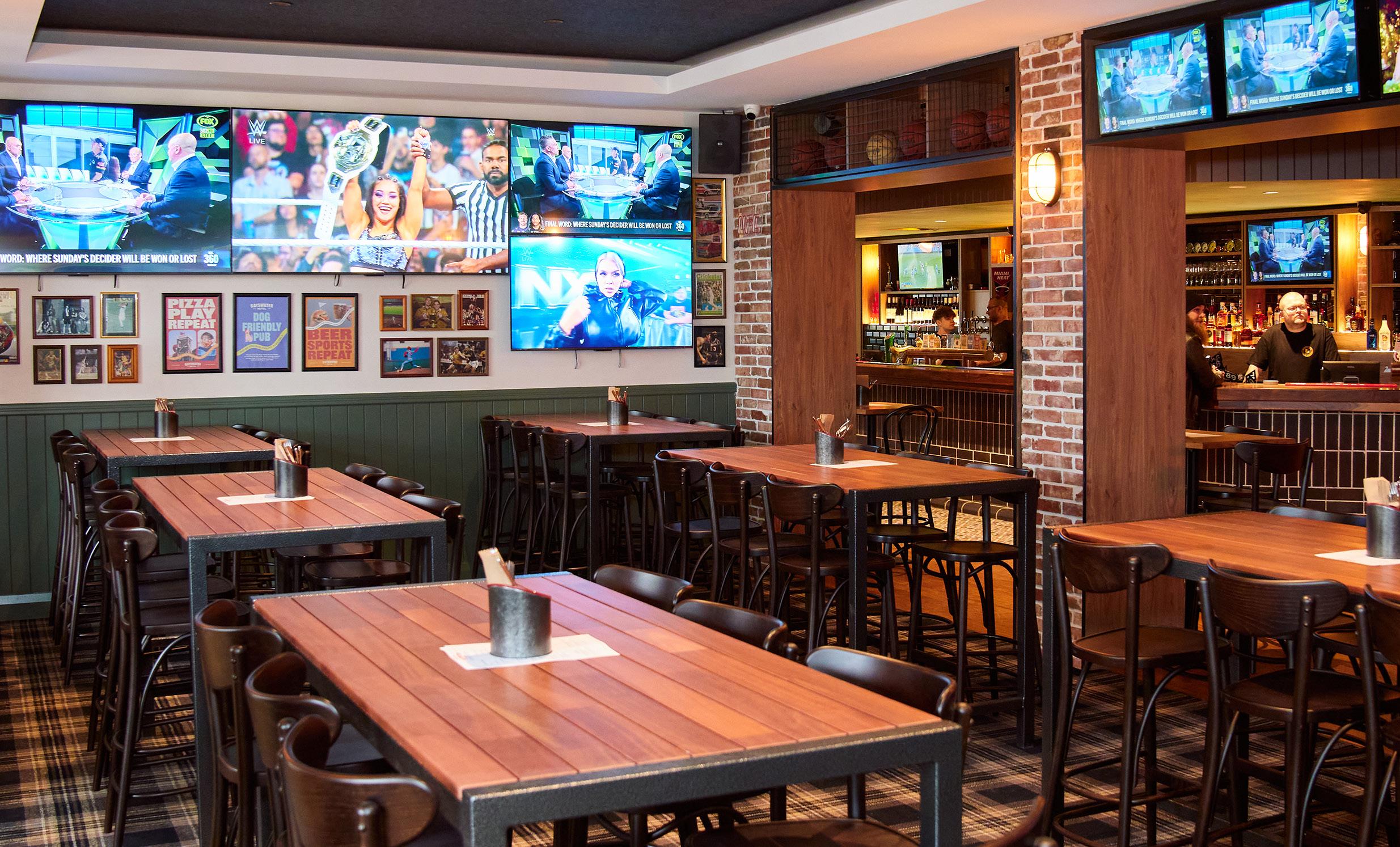
Bayswater Hotel




booth seating also gives the space a nostalgic edge and gives people space to settle in. From the layout to the furniture to the lighting, it’s been carefully considered to make people want to stay. It’s about creating comfort without sacrificing atmosphere.”
A strong food and beverage offering, Comiskey said, is also key to keeping patrons around and creates an opportunity to get thematic.
“We know that themed, event-driven food specials are always a hit. We’re talking buffalo wings and ranch for Super Bowl, or chicken parmies and schooner combos for Origin - those kinds of tailored offerings bring the fun, drive sales, and really tie into the sport-focused atmosphere.”
LocalsCo’s Marinich said the team achieved significant results after implementing food promotions.
“For us, food was secondary. We had a few of our sports bars running with very little advertised food in them and everything was fine. As soon as we started putting table talkers out and using table ordering software along with promos on screens, we instantly saw five per cent growth in our overall food take.”
BE SEEN
A key to the success of a sports bar is being front of mind for patrons.
Sturdy said to keep patrons coming back it is important to invest in promotion and community awareness.
“If you’re looking to invest in your sports bar, it’s one thing having the facility. You need to be known for it. Knowing how to promote your offering and making sure there’s consistency when a customer walks into your bar is equally as important. When the customer doesn’t have to guess what’s on screen and knows main games have priority sound, they’ll keep coming back. The ones that do that well, have their sports bars humming,” explained the Entain Venues MD.
Marinich said this is often one of the biggest challenges.
“Marketing and promotion are incredibly valuable. But it’s not always easy. It’s often easier to create a sustainable competitive advantage in general pub feel alone. Trying to be front of mind when someone asks, ‘Where should we go to watch the game?’ That’s the goal.”
His advice is simple – be creative.
“Think about offers and incentives. What can be done in house? Do we need an app? Can we use EDMs? I think all of this is hard to do well but consideration and creativity can lead to success.”
LED screens by Adrenalen Vision
Crown Hotel, Traralgon


Beyond this, LocalsCo connects with its communities over shared interests in sport.
“We sponsor a lot of local sport teams of differing age groups depending on the venue and the region. Not just footy or rugby, but, also darts, softball and water polo teams. We try and engage with the local communities, and that gives us a lot back,” said Marinich.
EVOLVE AND INNOVATE
As interests change, sports bars will continue to evolve into fully immersive social hubs.
Comiskey noted that understanding the versatility of a space is key.
“We’re seeing a trend toward versatility, spaces that can shift from a relaxed daytime hangout to a high-energy event hub in the late-night hours.”
Marinich pointed out LocalsCo’s success in this regard.
“We consider spaces as hybrid. If there’s no sport on, we learnt that you could turn down the lights and have a DJ booth or live entertainment. It helped us engage with the younger crowd too.”
Marinich also noted a shift in traditional betting in sports bars, fuelled by the younger generation.
“We’re seeing younger demographics (18 to 25) still have a bet. But it’s less isolating than the typical stereotype of people betting in pubs. They’ll play pool and have a bet and have some food. It’s communal and social.
He added: “We have dedicated TAB zones. We still need them, but they don’t need to be behind walls, they can be integrated where possible.”
Entain’s Sturdy also noted the trend of integrating wagering within your sports bar concept.
“In the sports bar market, there’s still this idea of putting in a big screen and having odds nearby. But I think that’s an area where there’s opportunity to evolve. They’re important elements, but they can no longer work alone.”
Sturdy’s advice to operators is take the opportunity to be creative and experiment with blending tradition and innovation.
Comiskey suggests creating a social interactive space that champions sport will always be at the centre of a sports bar’s sustainable success.
“No matter how much things change, the heart of a sports bar will always be about connection – bringing people together to celebrate, compete, and share moments. The venues that get this balance right will set the new standard.”
We’re seeing a trend toward versatility; spaces that can shift from a relaxed daytime hangout to a high-energy event hub in the late-night hours.
Rob Comiskey, director, Comiskey Group

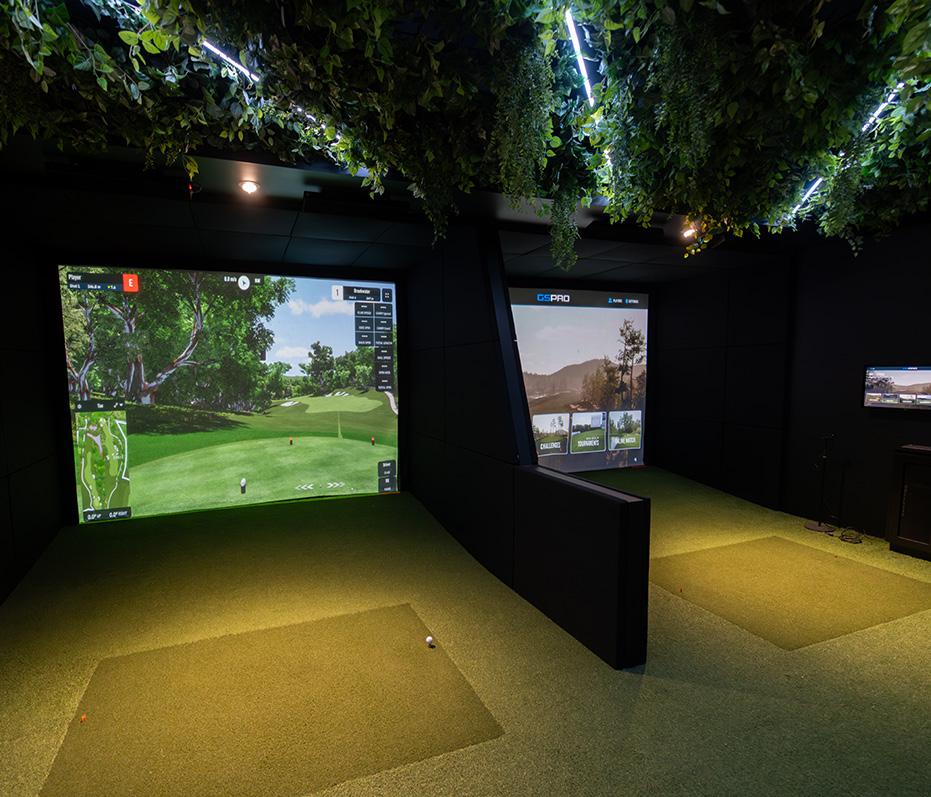
The new electronic darts booths at Dakabin Hotel
Golf simulators at Crown Hotel, Traralgon
MORE THAN 1,000 VENUES. EVERY WEEK.


Suburban stakes
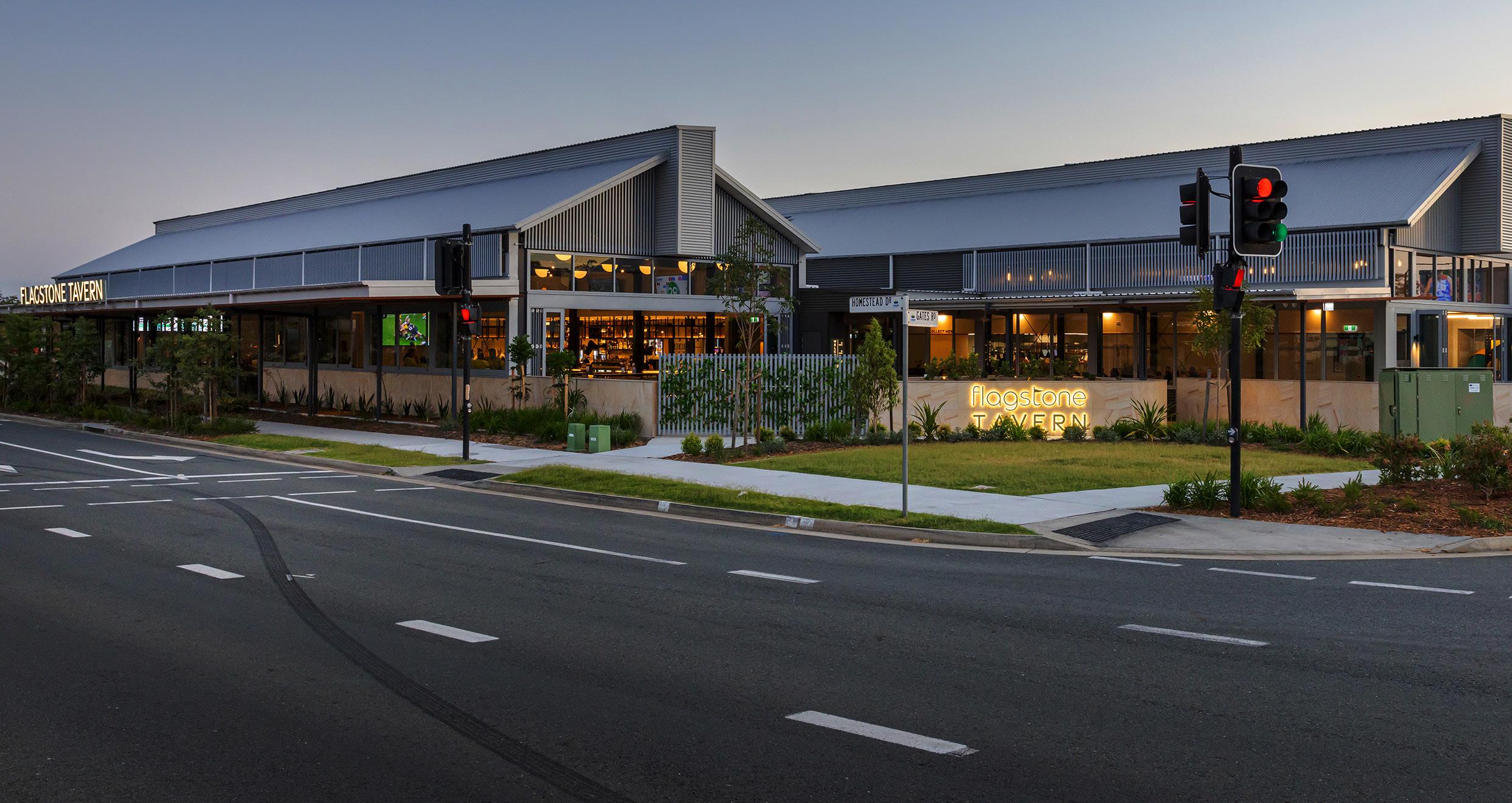
Whether through acquisitions, greenfield builds or renovations, pub investment has shifted to fast-growing residential pockets, writes Molly Nicholas.
AS POPULATION growth drives rapid change across Australia’s outer suburbs and regional centres, pubs have really proven their value as community anchors over the last 12 months.
Although New South Wales typically leads the way in annual transaction volumes, there has been an interesting flow of capital into states where pubs are usually tightly held. And with some of the most compelling pub investments happening outside of city centres, growing residential corridors are quickly becoming prime territory.
Ben McDonald, head of pubs – investment sales for JLL Hotels & Hospitality, says pub market participants are becoming more state-agnostic, and as a result, “securing assets that better align with their key investment criteria and objectives, no matter where they are located”.
Regional opportunities
With greenfield developments multiplying and housing corridors expanding, operators are moving fast to secure sites in south-east Queensland. Redcape in particular has a strong focus on the region, and since December 2024 has already snapped up 10 pubs in the state.
Although Redcape Hospitality has enjoyed a long history in Queensland, managing director Chris Unger has never observed a better environment for pub investment. He sees residential infill in high-growth regions and continued infrastructure projects as a critical opportunity for the hotel sector.
“The positive market signals are all there,” he told Australian Hotelier
“Strong population growth in south-east Queensland has been driving improvement in earnings and valuations for some time, and in the medium term we will likely see further sector consolidation as generational operators look to utilise their ever-strengthening balance sheets to accumulate venues, making assets even more scarce and ultimately more valuable.”
While Queensland remains one of the most active markets, opportunities are also growing in South Australia, according to McDonald.
“South Australia has certainly been a key growth market which has attracted significant national investor interest. We believe the trading opportunity is significant and importantly the legislative environment is stable, therefore underpinning investor confidence.”
After spending more than 30 years in the hospitality industry in Sydney, Mark Condi describes his move to South Australia as refreshing, having relocated to the state in 2024 to take on the role of CEO at Duxton Pubs. With the right investment behind it, he sees “significant untapped potential across the state”.
“It’s a state that is often unfairly overlooked, yet I’ve been thoroughly impressed by its drive and focus on growth – something now reflected in recent economic data and other performance indicators,” he explains.
Having maintained more stringent gaming regulations compared to the eastern states,
Flagstone Tavern was acquired by Redcape as part of its SEQ push
Condi describes South Australia as a state of less regulatory uncertainty, “which gives operators like us confidence in a stable longterm environment,” and makes the state more appealing to serious investors.
But beyond favourable gaming regulations, operators are attracted to the state’s fast-growing communities. Just last year Hurley Hotel Group pounced on the Barker Hotel. Well-located in the fast-growing Mount Barker region, the purchase marked Hurley Hotel Group’s first acquisition in five years, and although the family weren’t actively looking, project manager Anna Hurley says the pub presented a great opportunity.
“It had strong foundations, was already operating well, and offered lots of potential for improvement and growth,” she told Australian Hotelier.
“The building and land had unused space, and the area itself is experiencing significant population growth – something we haven’t seen in other locations where we operate. It was a chance to get into a fast-growing community with long-term upside.”
Tapping into growth
In newly developed or fast-growing residential areas, the best investments are those where operators
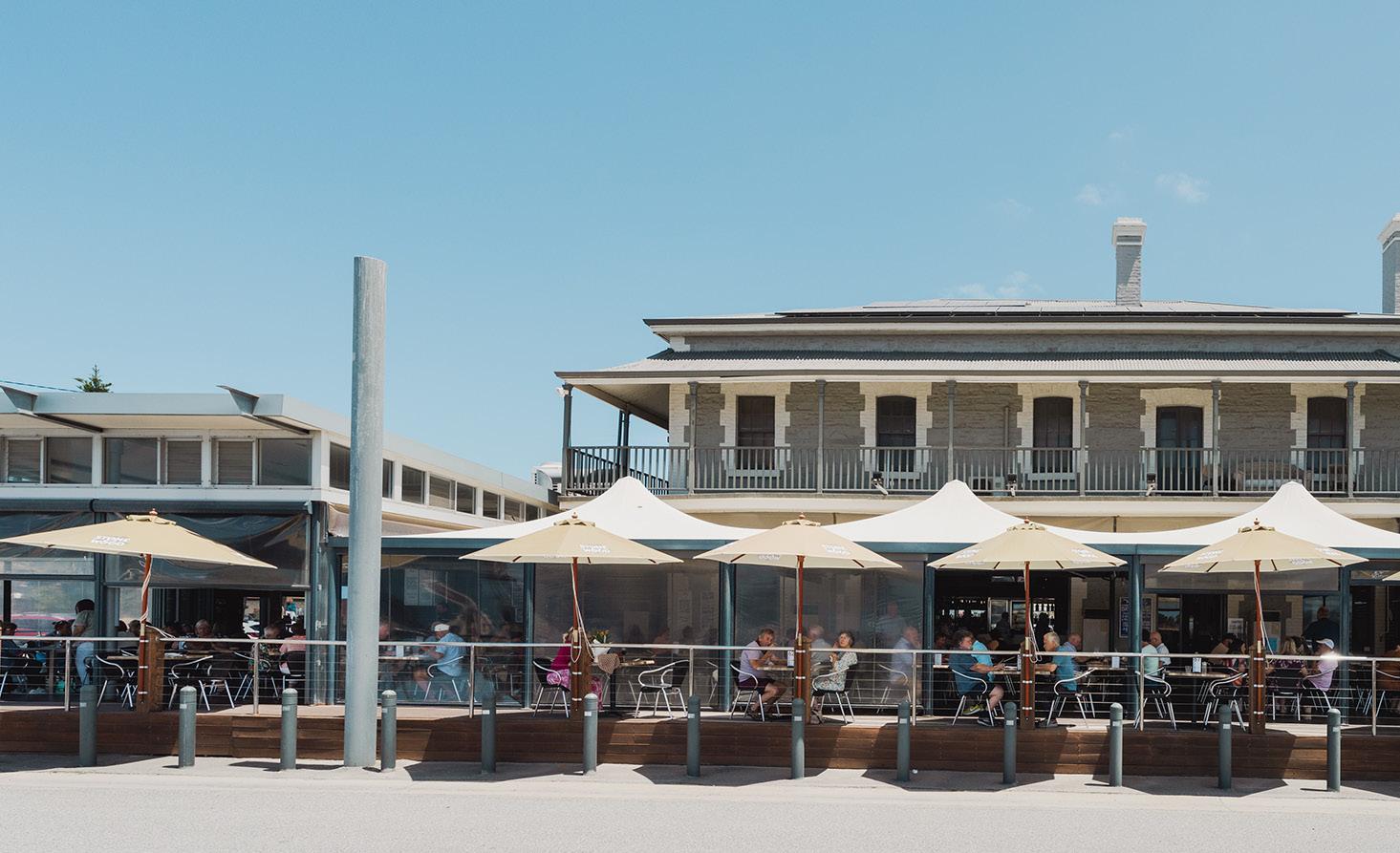
The appeal of starting from scratch is the ability to design a hotel specifically for today’s customer – without constraints like outdated layouts.
Anna Hurley, Hurley Hotel Group
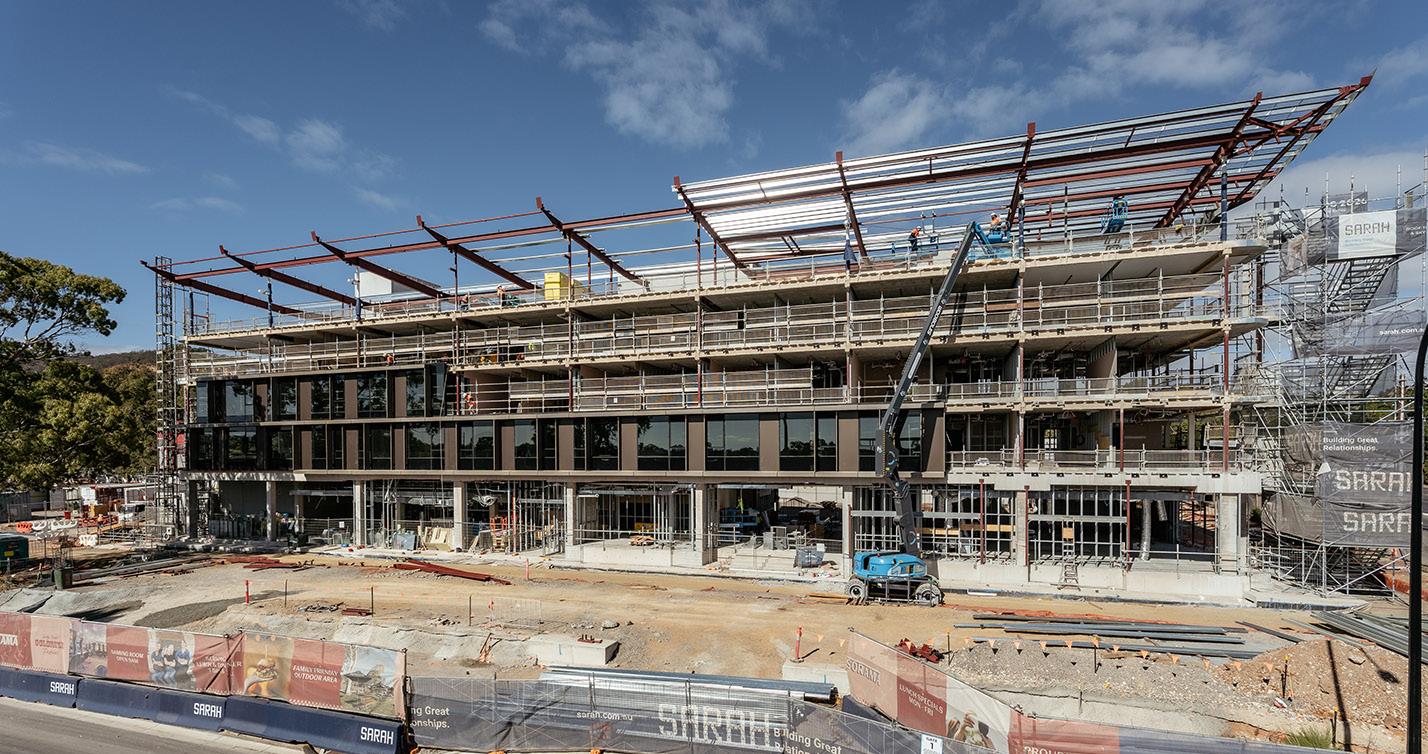

position themselves as early community anchors. But that’s not without risk – investing in a greenfield site or developing corridor often means committing capital before there’s a customer base in place.
For those willing to take the leap, McDonald identifies key factors that can support the decision.
“The broader development scheme, forecast population growth and legislative considerations are all factors worthy of deep consideration. Operational considerations post-construction should also be weighted accordingly in the overall decision-making process.
“For many greenfield projects it can be a five-year commitment – from site acquisition, planning and approvals, construction and finally opening the doors. It’s a long time before the first beers are poured.”
With 25 venues in its stable – 22 operated by the group and three owned as freehold-only – Duxton Pubs’ growth strategy favours geographicallydiverse assets and operational balance.
“Our venues are spread across the state and classified into four key regions: metro, outer metro, south-east, and north. This geographical spread allows us to cater to different demographics and market conditions,” says Condi.
“When our metro venues are bustling during events like Gather Round, our regional venues may be quieter, and vice versa – regional venues often peak during school holidays or long weekends, especially those with strong accommodation offerings.”
While there are natural challenges, Duxton’s regional pubs are strong contributors to the overall business, often balancing metro performance depending on seasons, school holidays and tourism cycles.
“Land is more affordable, and there’s usually greater space for development. We also have a higher concentration of accommodation assets in regional areas, which generate strong revenue and complement the food and beverage offerings,” Condi added.
Duxton Pub’s latest acquisition, Birkenhead Tavern
The Hotel Panorama build will be complete in early 2026
The Hurley Hotel team and families at Barker Tavern
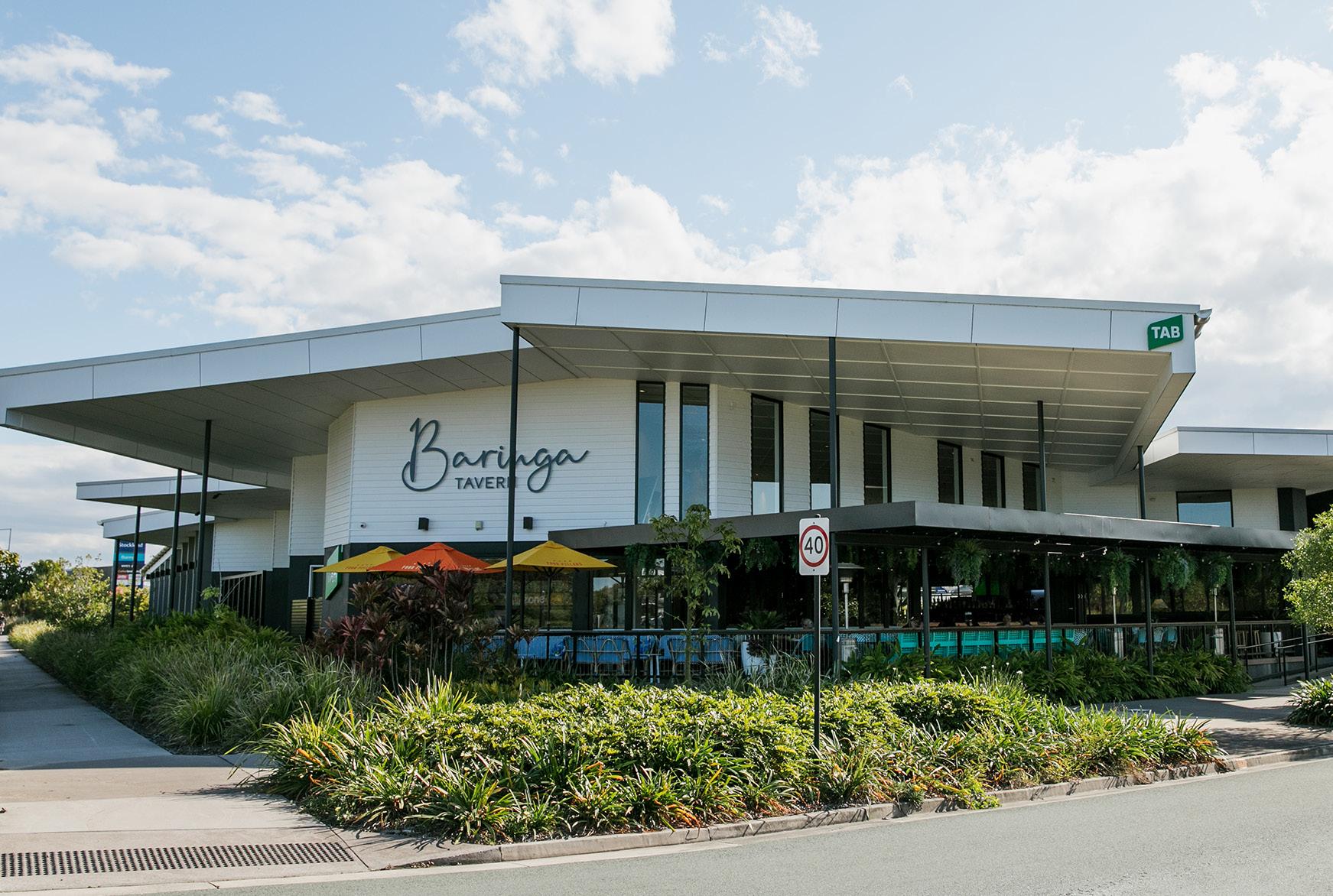
While identifying opportunities is half of the equation, realising that potential takes thoughtful execution and often requires publicans to take a unique operational approach.
Unger says: “It differs from venues in the more established areas [where] often there is more competition, and established venues often narrow their focus on their strengths. Whereas, in a new area you can find yourself being all things to everyone, which can be double edged, but it makes for more rounded and interesting venues, which is exciting.”
Starting from scratch
Operators pursuing new builds in growth corridors have a rare chance to create a purpose-built pub tailored to the lifestyle of a growing demographic. A greenfield site allows complete control, but starting from scratch also comes with complexity.
While Hurley Hotel Group has demonstrated its interest in underserviced communities and population growth areas with the acquisition of the Barker Hotel, the group is also undertaking a mammoth project in southern Adelaide with the $60m Hotel Panorama build, which is set for completion in March 2026.
Though the group didn’t set out to build a new hotel, they didn’t want to lose the Tonsley Hotel’s valuable license when it was compulsorily acquired and
demolished to make way for Adelaide’s extended North-South highway.
“Since new licences are hard to obtain in South Australia, we searched for a nearby site to retain it,” Hurley explains. “Panorama was ideal – it’s a growing area that’s under-serviced for pubs. The site allowed us to preserve the licence and invest in a high-potential location.”
Marking Hurley Hotel Group’s largest investment to date, the family sees the project as a rare opportunity to design a future-proof venue with flexibility. Paying close attention to the needs of the growing community, the venue will feature four distinct hospitality spaces – a rooftop bar, restaurant, sports bar and casual lobby bar – with three additional function rooms.
“The appeal of starting from scratch is the ability to design a hotel specifically for today’s customer – without constraints like outdated layouts,” says Hurley.
“Our nearby hotels at Tonsley and Marion have consistently high occupancy, indicating strong demand for accommodation. We also considered the area’s demographics and local amenities like Flinders Hospital and Marion Shopping Centre. We planned 77 rooms, significantly more than Tonsley’s 20, and included long-stay options with kitchenettes,” she explains.
“You can design the venue exactly how you want, without being limited by an existing structure or the need to trade
It is often the case that there is a high proportion of customers with a mortgage in newer areas which we are mindful of. We try to focus on affordability and value, all-family occasions and our role in community life.
Chris Unger, Redcape
through construction. However, starting from scratch also brings more planning, budgeting, and regulatory hurdles. The end result, though, is a venue that’s better tailored to today’s hospitality needs.”
While those who pull it off can establish a flagship venue with a strong local identity, a long-term mindset is required to navigate planning approvals, work with developers and regulators, and manage costs.
“Engaging with state regulators early can reduce any potential downtime from a licensing point of view and ensure a somewhat seamless transition from construction to trading,” says McDonald. “Optimising the hotel design in the planning phase can also significantly impact the success of the business.”
Shaping a community’s identity
In Australia’s emerging residential corridors, pubs are becoming central pillars of new communities, and by embedding themselves early, they play a foundational role in the cultural identity of the neighbourhood.
“Being part of the community is critically important to our team,” says Hurley. With a strong launch ahead for Hotel Panorama and a vision to embed the venue in the fabric of the community, the group is committed to staying relevant and engaging patrons in new ways.
At the Arkaba Hotel, which was
Redcape acquired Maeva’s portfolio of Sunshine Coast pubs
revitalised through a $10 million renovation in 2023, the sports bar has more recently been transformed into an entertainment hub with digital darts and shuffleboard. With several new residential developments opening in the area, the team is embracing the opportunity to welcome a new wave of locals.
“We’ve held open nights, distributed vouchers, and run local offers to introduce ourselves. These efforts have helped us connect with new residents and build long-term relationships,” Hurley stated.
As these suburbs continue to take shape, the connection pubs build with their communities aren’t just meaningful – they’re strategic. For many, these early relationships lay the groundwork for long-term loyalty as the population continues to grow.
To attract locals in the early days, Unger emphasises the importance of accessibility.
“It is often the case that there is a high proportion of customers with a mortgage in newer areas which we are mindful of. We try to focus on affordability and value, all-family occasions and our role in community life,” he explained.
This community-first approach is not just a matter of philosophy, it’s central to Redcape’s long-term investment strategy. With over $20 million currently committed to capex projects across the state and further acquisitions in the pipeline, south-east Queensland will continue to play a significant role in Redcape’s investment strategy.
Speaking to the recent acquisition of the Flagstone Tavern in Brisbane’s south-west, Unger stated: “Where it is easy to see that a community is growing and investment in the area is well progressed, a lot of the risk is gone, and as the community grows so too will the pub.
“We see those dynamics present in Flagstone and around the Sunshine Coast, and we have benefitted from that dynamic in the Gold Coast for the last 10 years or more too,” he added.
Although Redcape is taking a long-term view, there is still another layer to the opportunity – scarcity.
“The challenge lies in getting hold of assets. Publicans don’t often want to sell them and greenfields are getting even more difficult, making it even more challenging to get them. This scarcity must drive up the cost to acquire,” Unger continued.
In South Australia, the strategy for investment is also evolving. At just four years old, Duxton Pubs has grown rapidly. The group’s recent acquisition of the Birkenhead Tavern in Port Adelaide signals an interest in further portfolio growth, and Condi is confident that the group is well placed internally to do so.
“Over the past 18 months, our focus has been on strengthening our foundation – whether in procurement, operations, data, or marketing. By building out the right systems and leveraging group efficiencies, we’re improving profitability and enabling smarter growth.
“This internal consolidation now positions us well to both optimise existing venues and take on new opportunities… We have the infrastructure, the leadership, and the momentum to continue growing our portfolio while ensuring each venue is run to the highest standard.”
Across the board, growth corridors present a unique mix of opportunity and complexity, but one message is clear – as suburbs grow and evolve, the key is laying down roots from the beginning.
PROPERTY AND INVESTMENT
Duxton’s portfolio spans regional and metro assets (below) that are activated at different times of the year

For many greenfield projects it can be a five-year commitment – from site acquisition, planning and approvals, construction and finally opening the doors. It’s a long time before the first beers are poured.
Ben McDonald, JLL Hotels & Hospitality


Study Tour inspiration
The 2025 Pub Leaders Summit Study Tour visited three Brisbane pubs at various stages of transformation – Dakabin Hotel, the Grand View Hotel and the Lord Stanley Hotel – providing attendees with plenty of food for thought around modern pub design.


The greenfields build

Dakabin Hotel
Sin Bin Sports Bar: Curved LED screen above the central bar, two electronic dart booths, retro booth seating, pool tables, converts to a nightclub with a stage on Friday and Saturday nights.
Two-kitchen concept: Bistro produces a panAsian and a Western menu, with the kitchen split in half.
Tween and teen friendly: Arcade room with several games, as well as a halfbasketball court.
The place to be: 5000 people made bookings within 48 hours of reservations opening.


It’s really cool…to see that hospitality isn’t just your version of hospitality – there’s a bunch of different ways that you can do it –and what little bits we can borrow and barter from each other.
Katherine Pullos, The Pullos Group



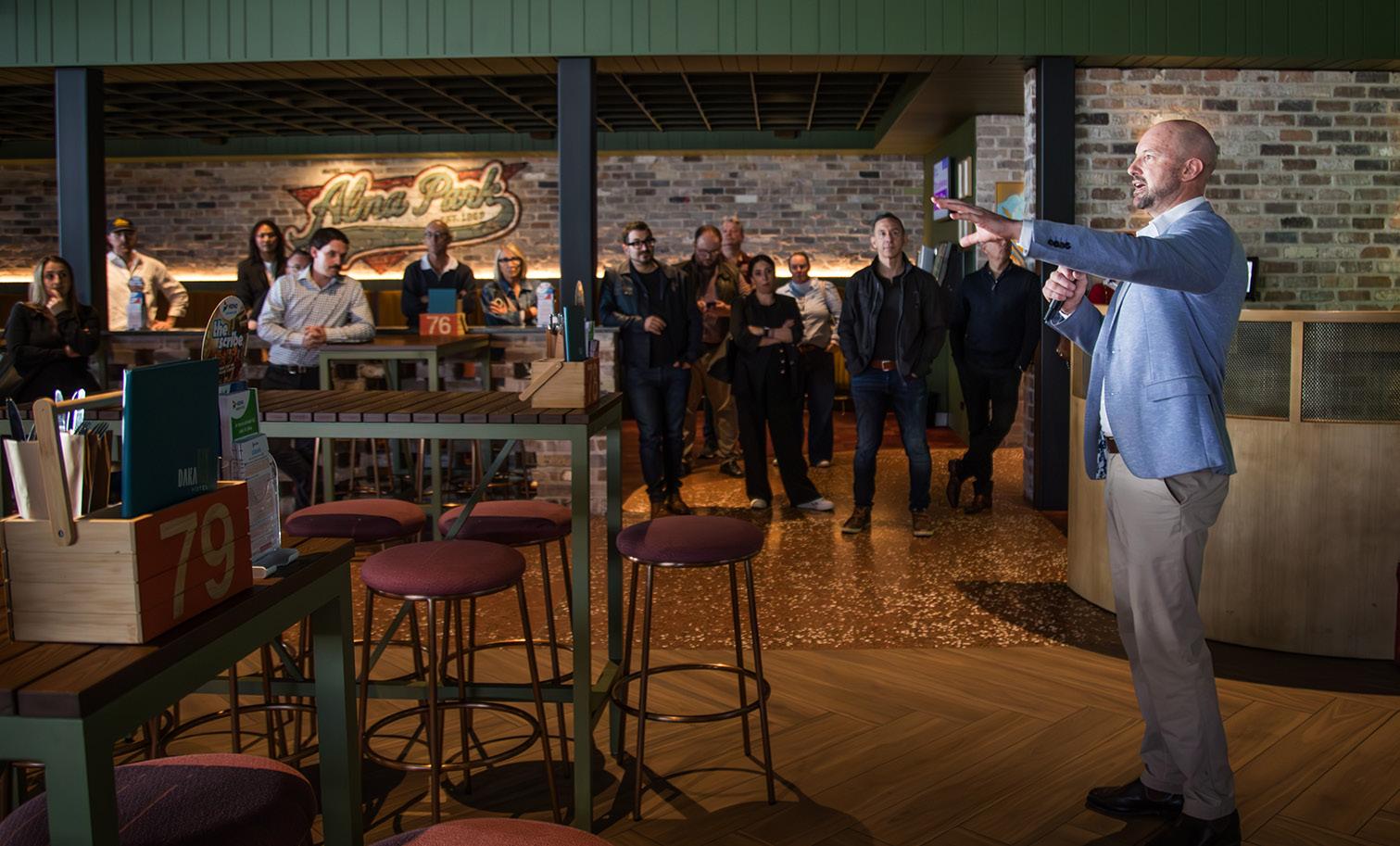
The heritage restoration
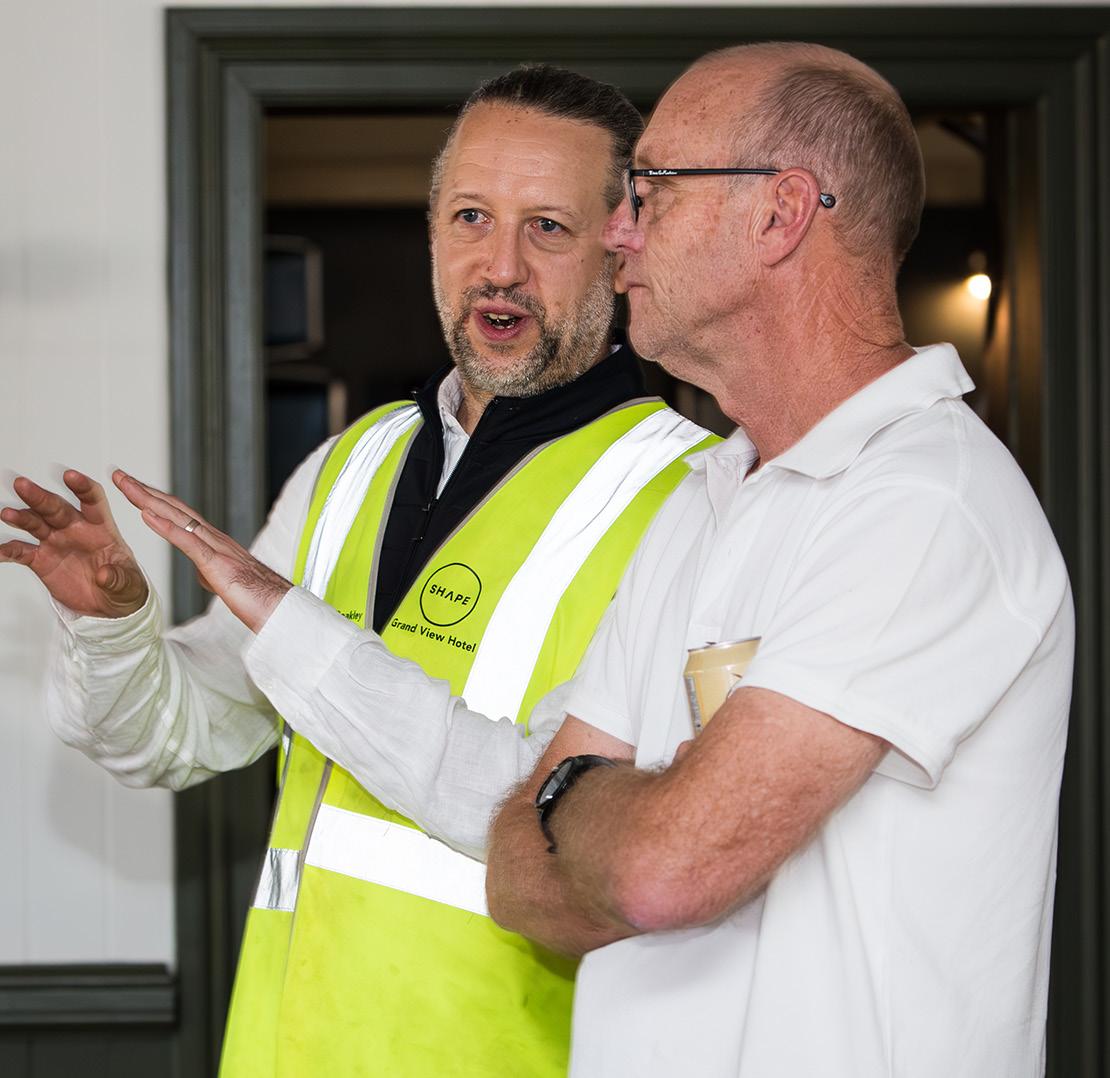
Grand View Hotel
Versatile outdoor concept: Casual, communal picnic table seating with a pet-friendly grass area, large outdoor screen for live sports.
Alfresco dining area: connecting inside with outside, seating approx. 120 patrons, offering a premium open-air experience with scenic views of the grounds.
Function marquee: Stylish, purpose-built marquee accommodating up to 120 seated guests or 150+ cocktail-style, featuring its own dedicated bar and private amenities.
Container bar: Centrally positioned to serve both the function marquee and general outdoor dining areas.
Commercial kitchen feature: Will include the largest Josper Rotisserie in Australia and the only one of its kind in Queensland, allowing for unique charcoal cooking techniques.
Trees of note: The banyan tree on the grounds is believed to be the oldest in Queensland, estimated to have been planted circa 1924. It is heritage-listed and protected as part of the site’s landscape plan. The mango tree also remains an iconic feature of the grounds, offering shade and character to the outdoor space.


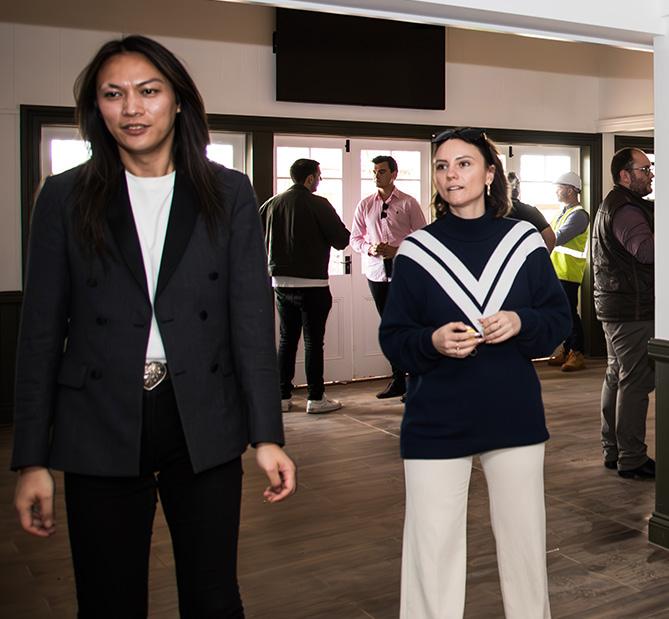
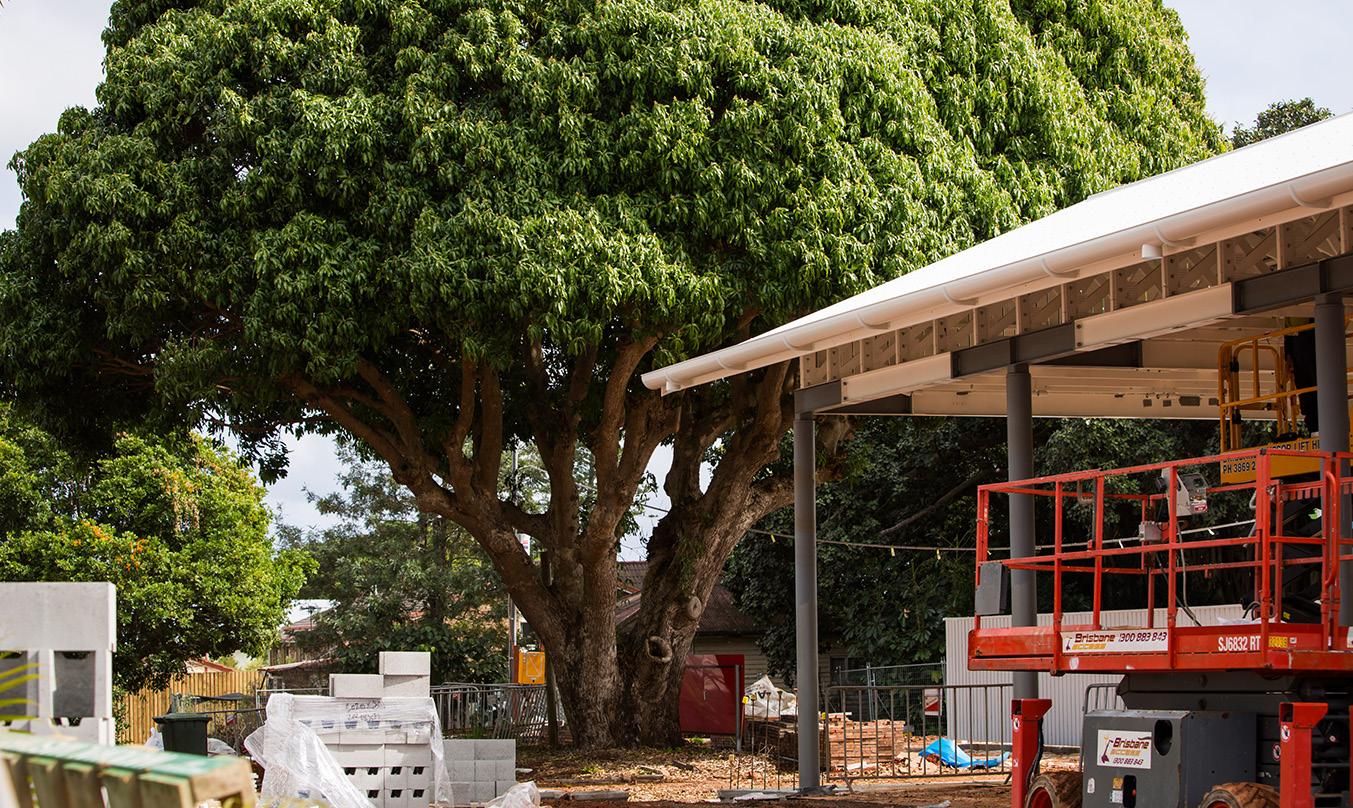
It’s good to interact with the people building the projects or the managers of the hotel, and talk to them about what went into the project.
Nick Milesi, Murray Bridge Hotel

The inner-city green oasis

Lord Stanley Hotel
Optimising space: The new and expansive gaming room was previously the drive-through bottle shop.
Green thumb: The Green Wall in the beer garden has more than 7000 plants in it, from close to 100 different varieties.
Water-saver: Located under the beer garden are three 10,000L rainwater tanks to harvest rainwater, which is estimated to save circa 130+ days of using town water for irrigation.
Hero tree: The Pandanus tree at the centre of the beer garden was relocated from a property in the Gold Coast and installed one week prior to Cyclone Alfred. The cost of relocation and planting of Pandanus came in at roughly $27,000.
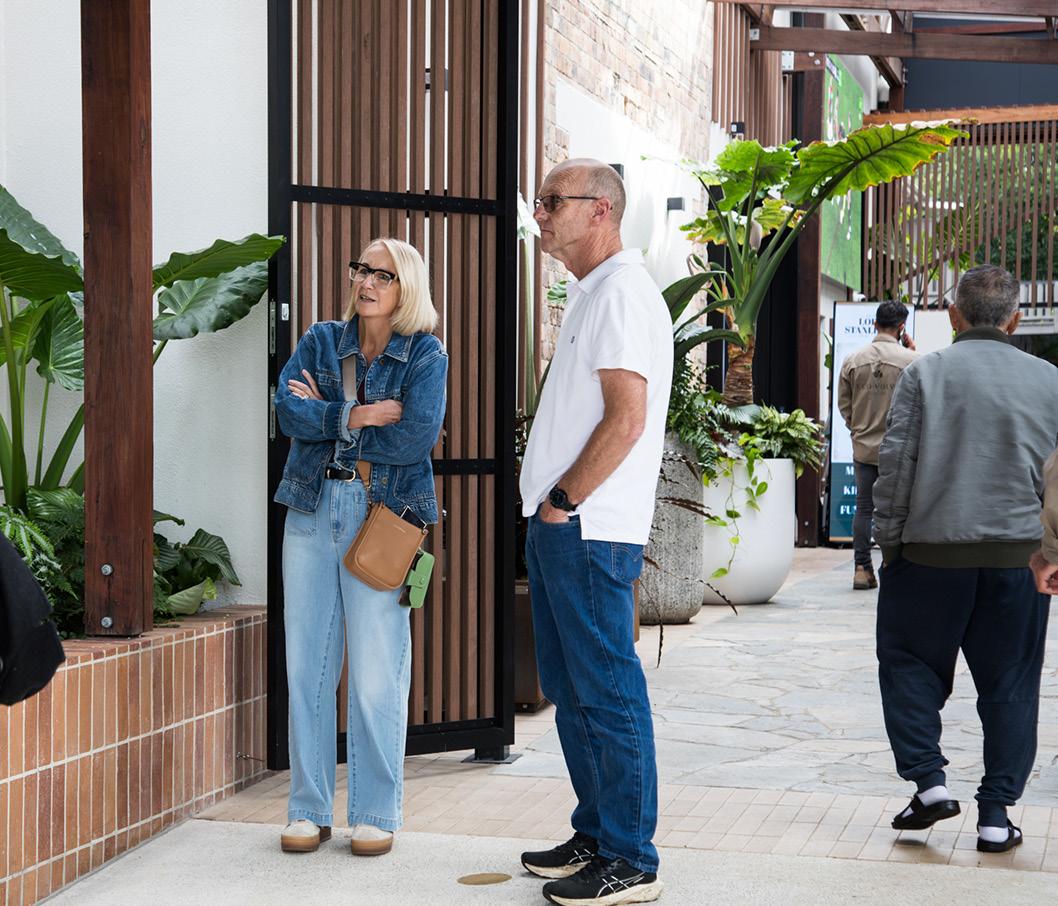

In Queensland their outdoor offer is quite good... I’m doing a project at the moment with our pub’s outdoor offer, so I can definitely take a lot home.
Daniel Cassin, The Grove Tavern
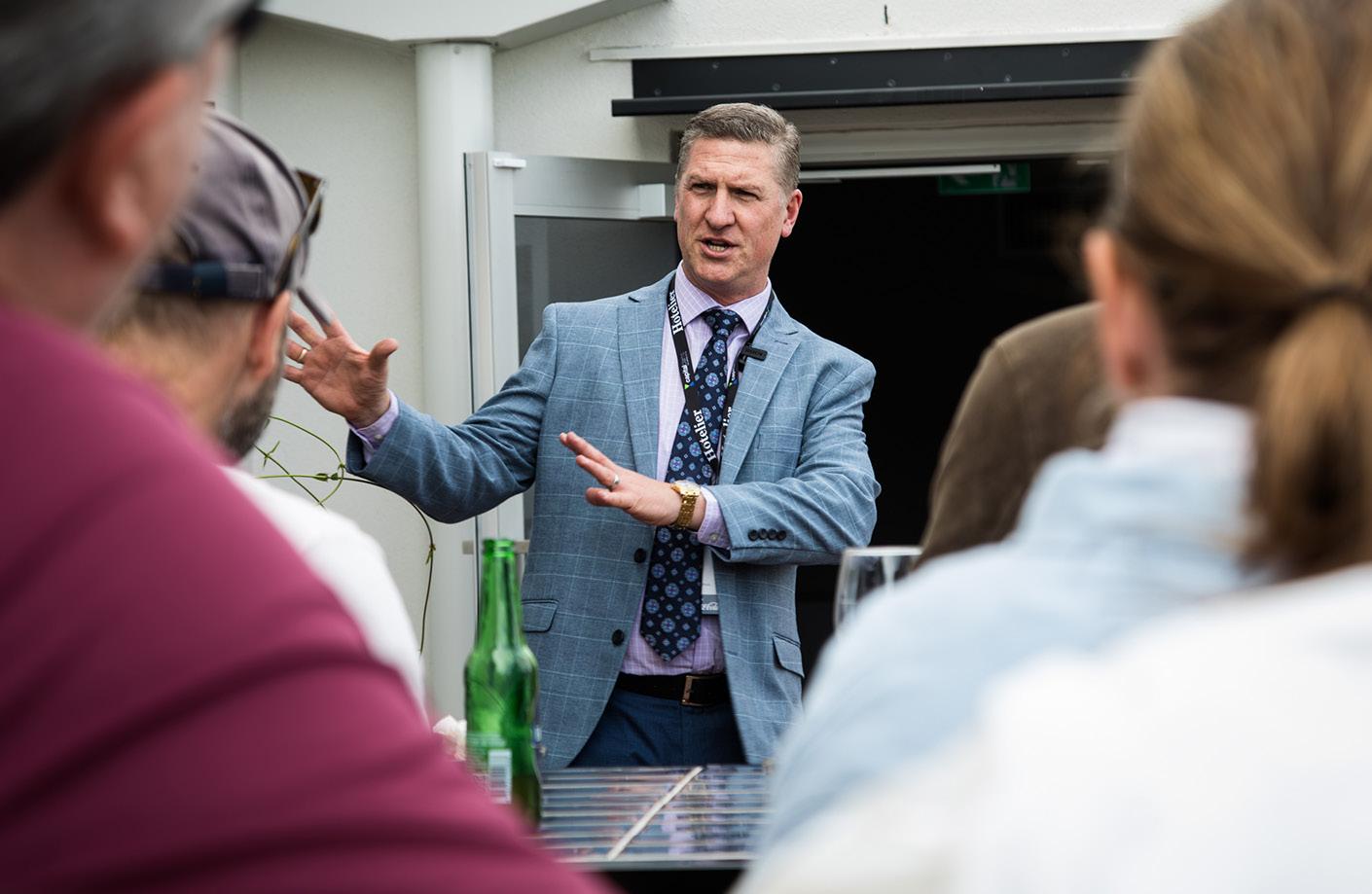


High Country hospitality
Trading city life for a hospitality tree change, four mates-turned-locals are reviving the once beloved watering hole in the historic town of Yackandandah in northeast Victoria.
FOLLOWING ITS closure in late 2024, four new out of town publicans have taken on the revival of the Yack Hotel with doors reopening 1 August.
The team includes former executive chef of Melbourne’s Yolk Group, Dale Kemp, his partner Brittany Hart, Jackson Cartwright and Sian Haycock.
Affectionately known as ‘The Bottom Pub’, The Yak was built in 1868 to serve the town’s goldmining community and was a social hub for the region located on popular tourism routes to Bright, Albury and the wider High Country and a short drive from Beechworth.
Now, with a new team and a considered refresh, the Yack Hotel is ready for a new start.
Hart said the couple’s decision to take on the project was rooted in their love of the small town.
“Dale and I have been coming up here for years. We’ve got friends here and just fell in love with it. Every time we’d drive back to Melbourne, we’d be looking at real estate up here.”
Kemp added: “I think we were already in love with the pub before we even looked

at it. We thought if it wasn’t completely falling apart, we were going to take it.”
With a focus on restoration over renovation the venue draws inspiration from mid-century style and some of the pair’s favourite Melbourne pubs.
“We didn’t want to come in and knock down walls. We just wanted to make it look like what it would have looked like when it was first built. We’ve kept everything classic and cozy,” said Kemp.
Noting her approach to the design and feel, Hart pointed out the differences between a project in a historical town and a big city like Melbourne.
“The council have very tight guidelines on what your branding needs to look like, your fonts, your colours on the exterior of the building – everything. So, several considerations were taken towards the look of the exterior too.”
Original structural elements have been retained, including heritage ceiling plasterwork and brown brick that wraps the front bar to ensure each spaces preserves Yackandandah Hotel’s oldworld charm.
Similarly, Kemp said to curate a strong menu, he considered the pubs location and the community needs.
“In Melbourne there was room to be adventurous. Out here we are spoiled with beautiful ingredients and opportunity, but at the end of the day, we know people just want good quality food,” he said.
“We’re keeping it honest and sticking to the classics.”
Utilising the local ingredients, Kemp’s menu celebrates the produce and people of Yackandandah.
“We love the produce available here and the relationships that you can build with the local suppliers and producers. They’re all incredibly passionate about what they do. We’re excited to buy directly off them and tell their stories to the locals or those passing through.”
Hart said at the core of the project, the team’s hope is to return the local favourite to the community.
“In Melbourne you have potentially millions of people walking past your pub, but for us, the locals are the people that are going to keep the pub going, so it’s for them.”
Opening night at The Yack
Jackson Cartwright, Dale Kemp, Brittany Hart and Sian Haycock.
